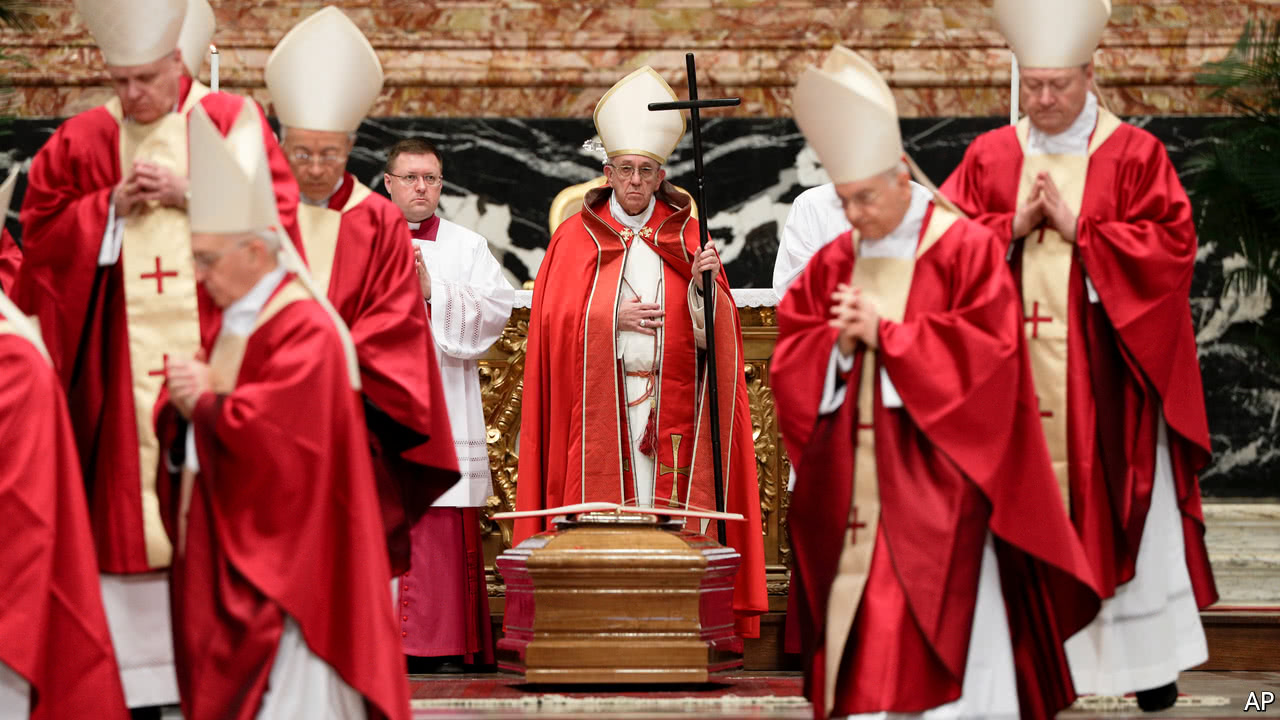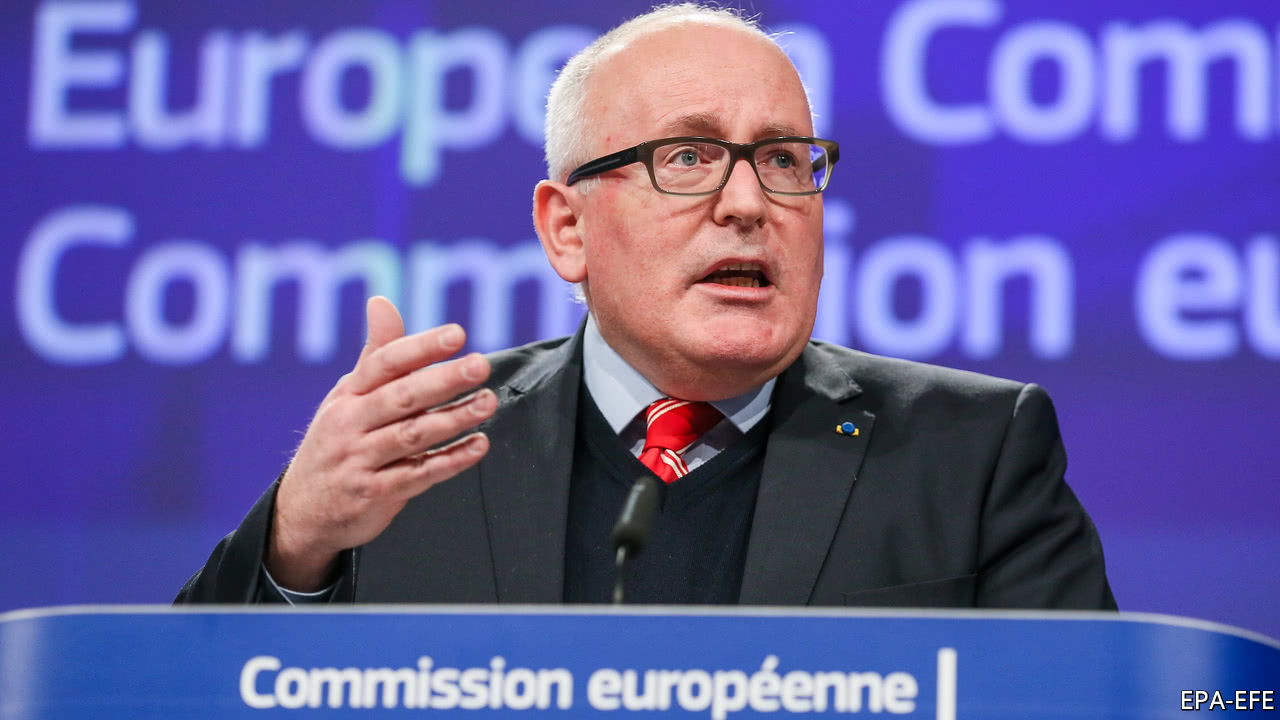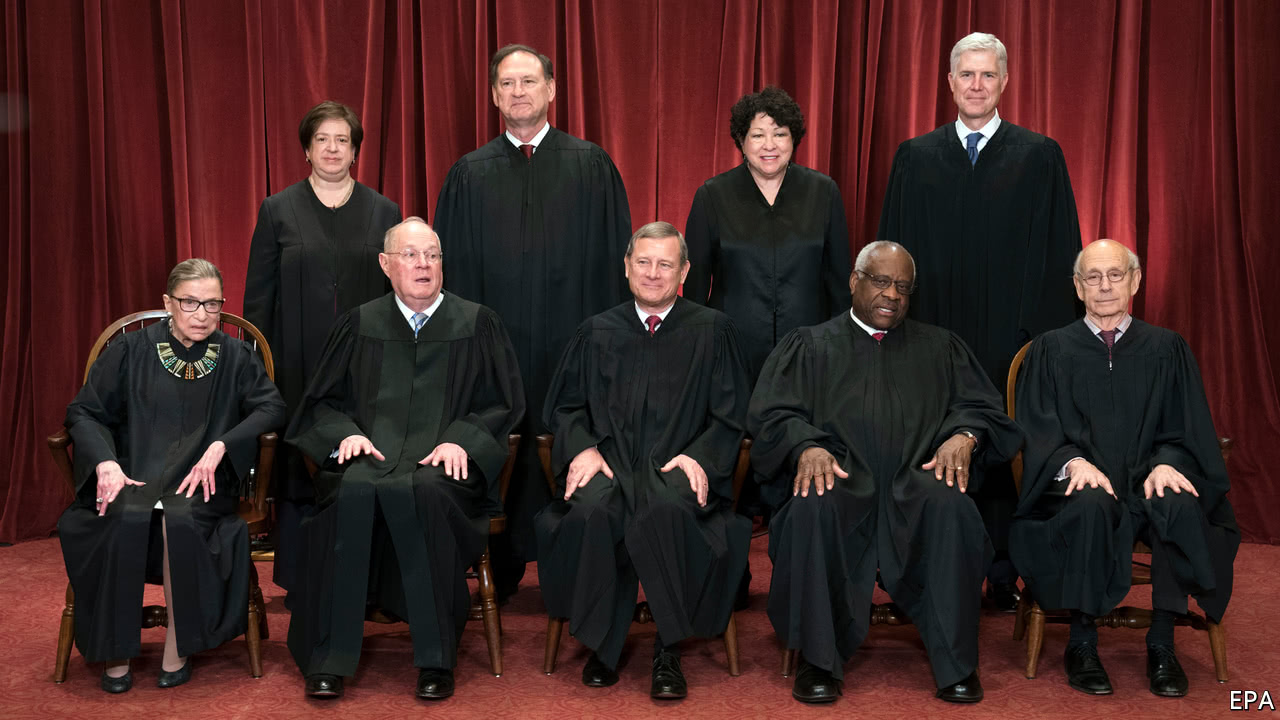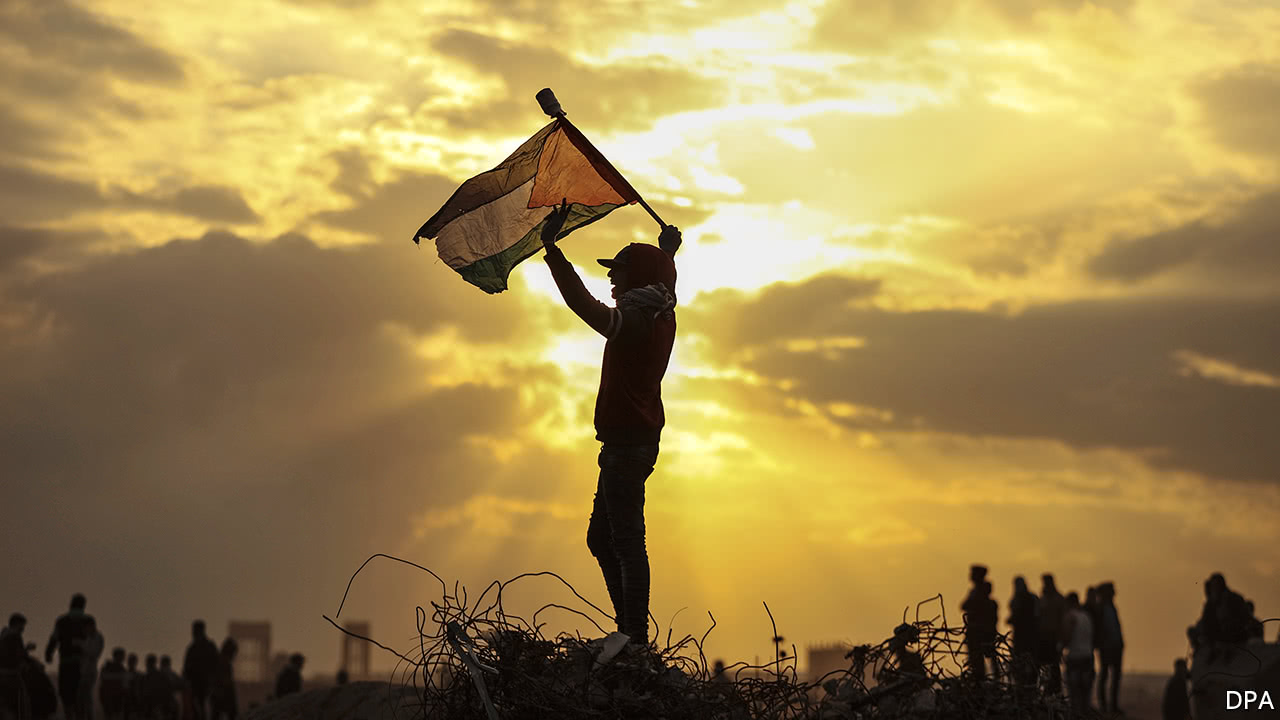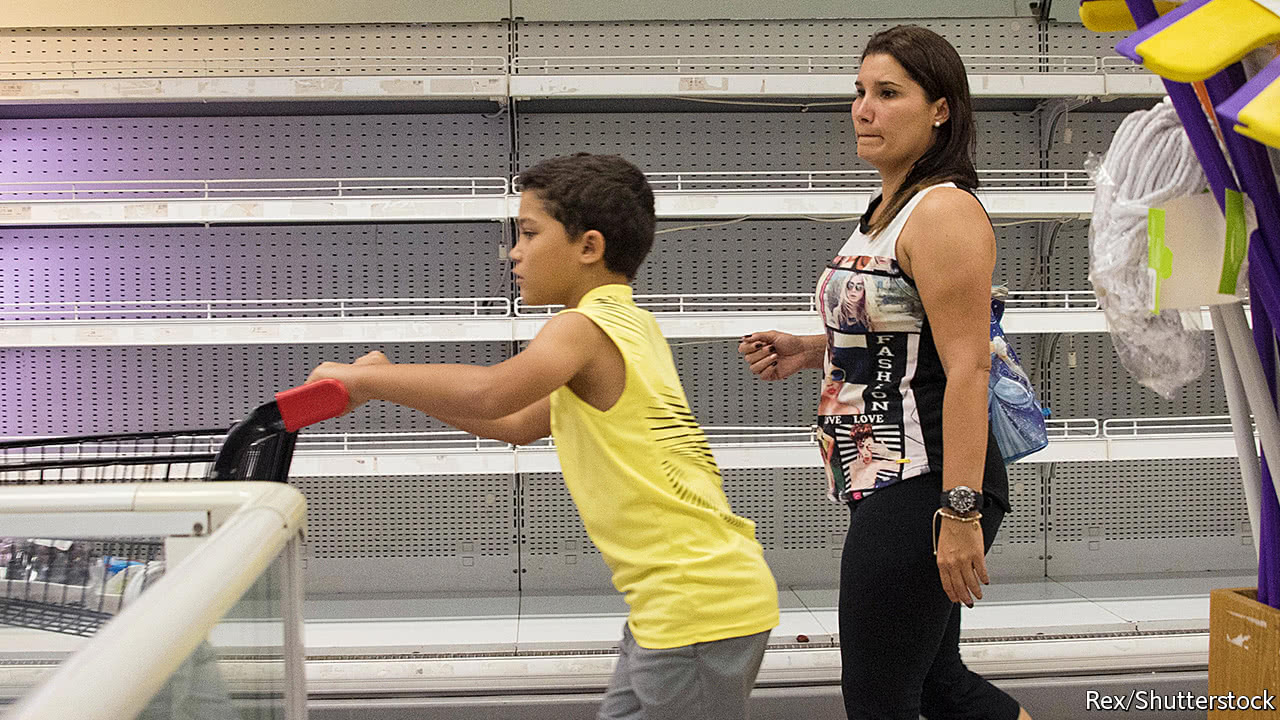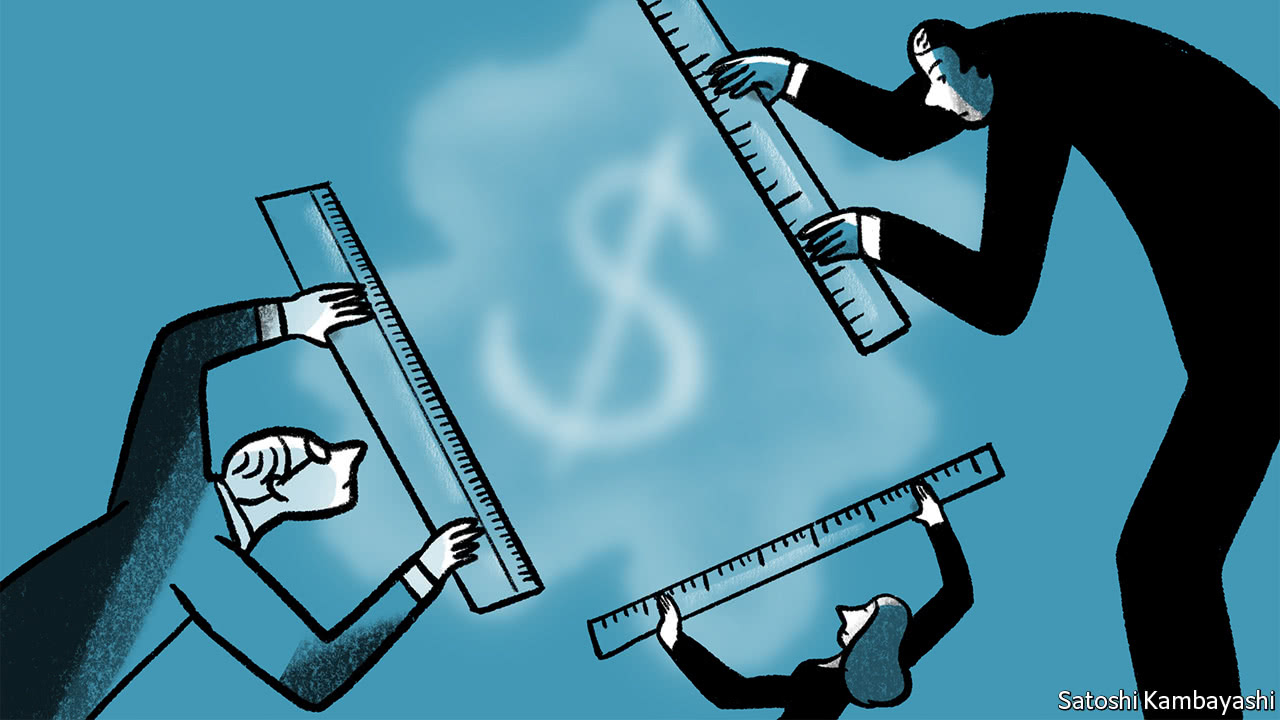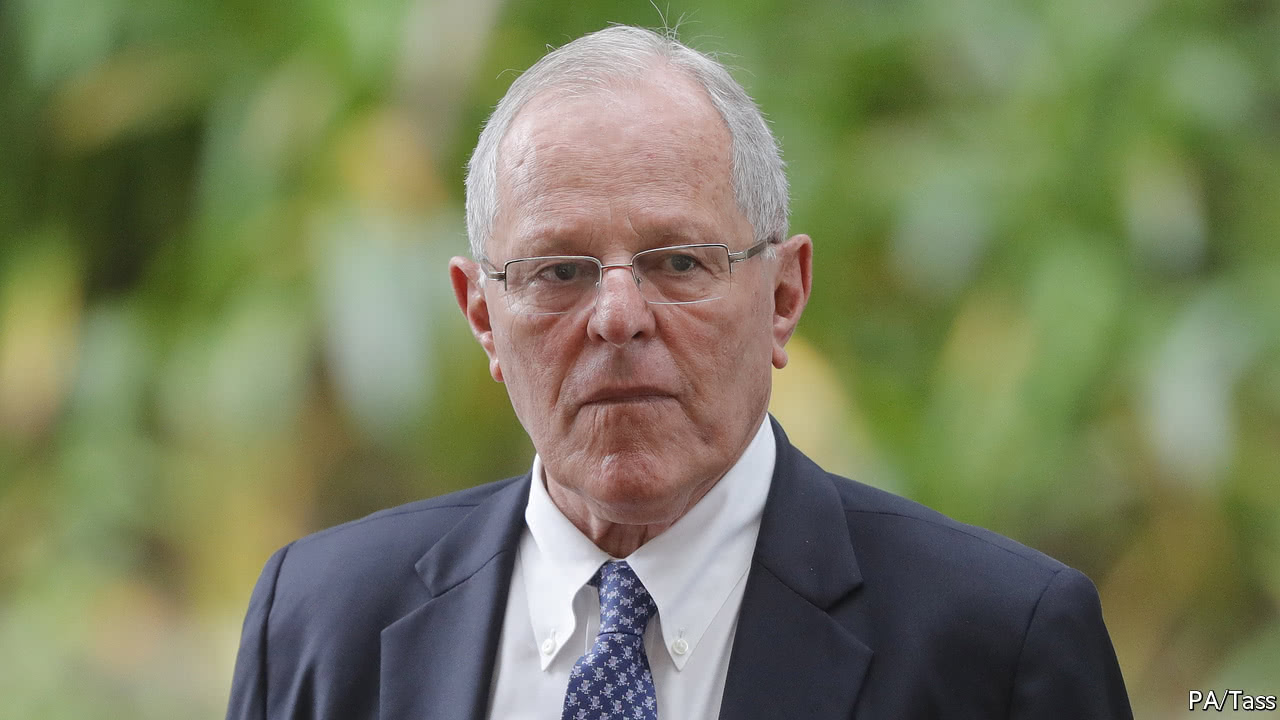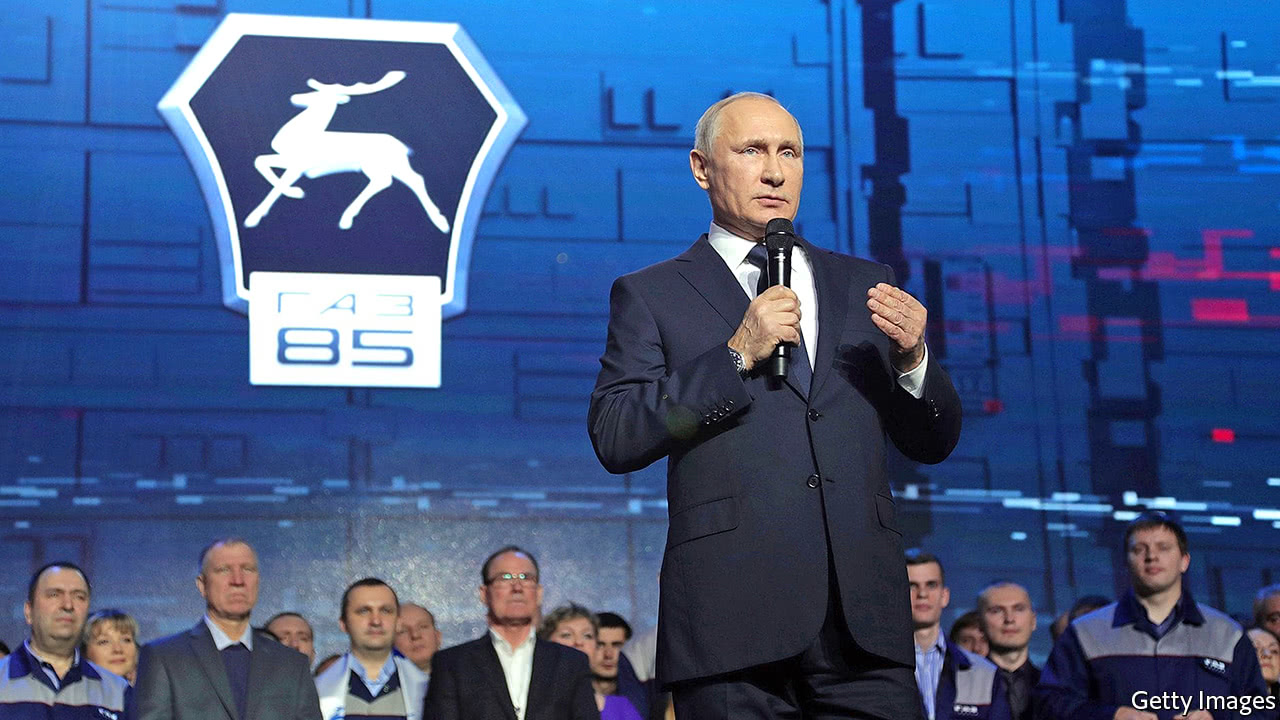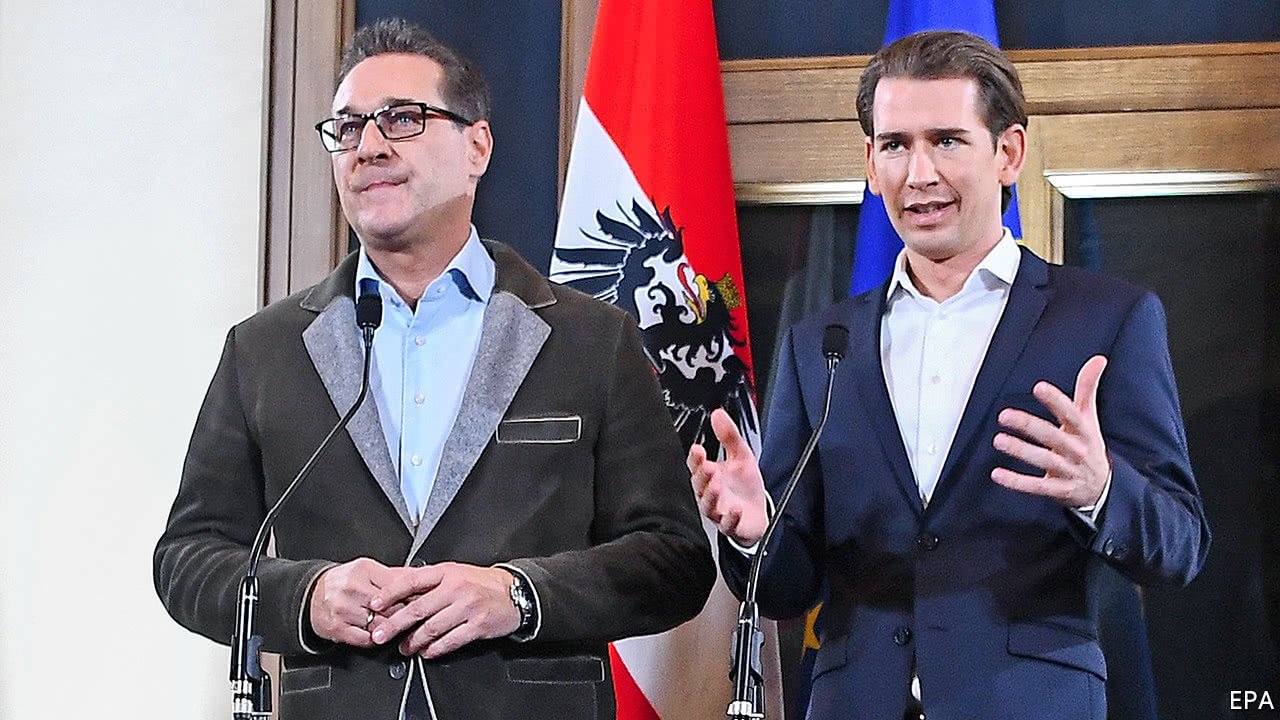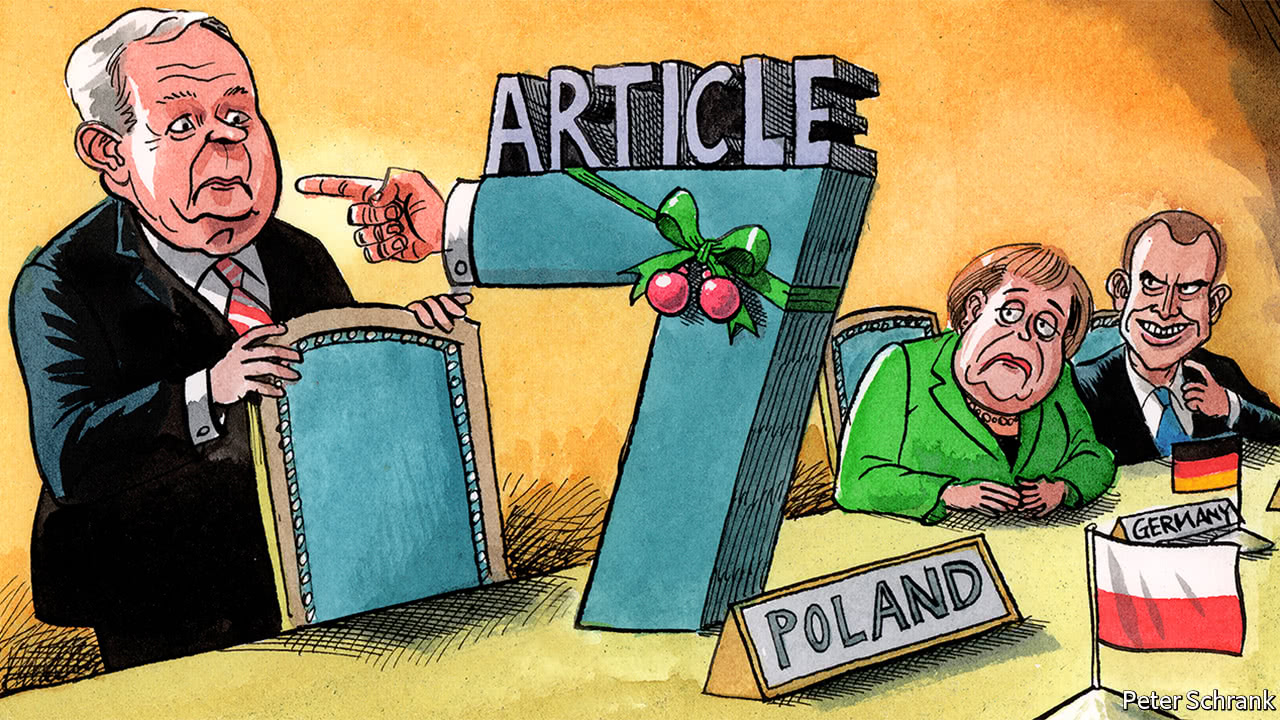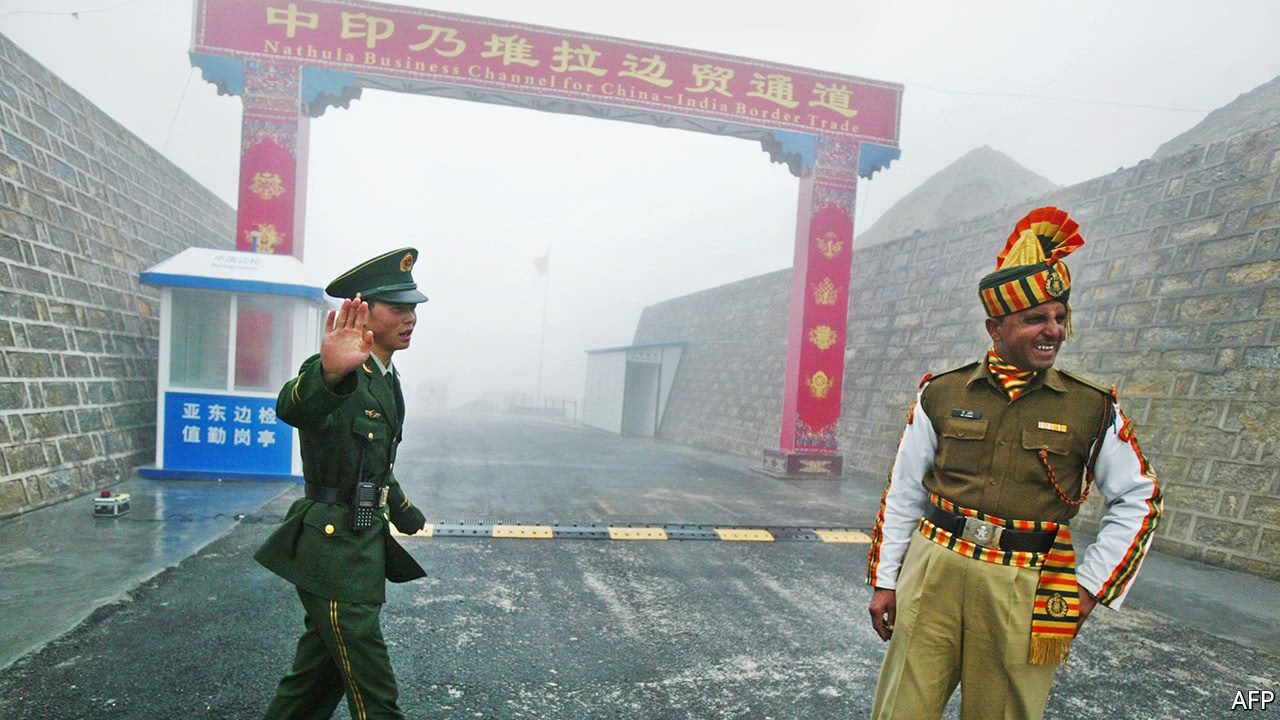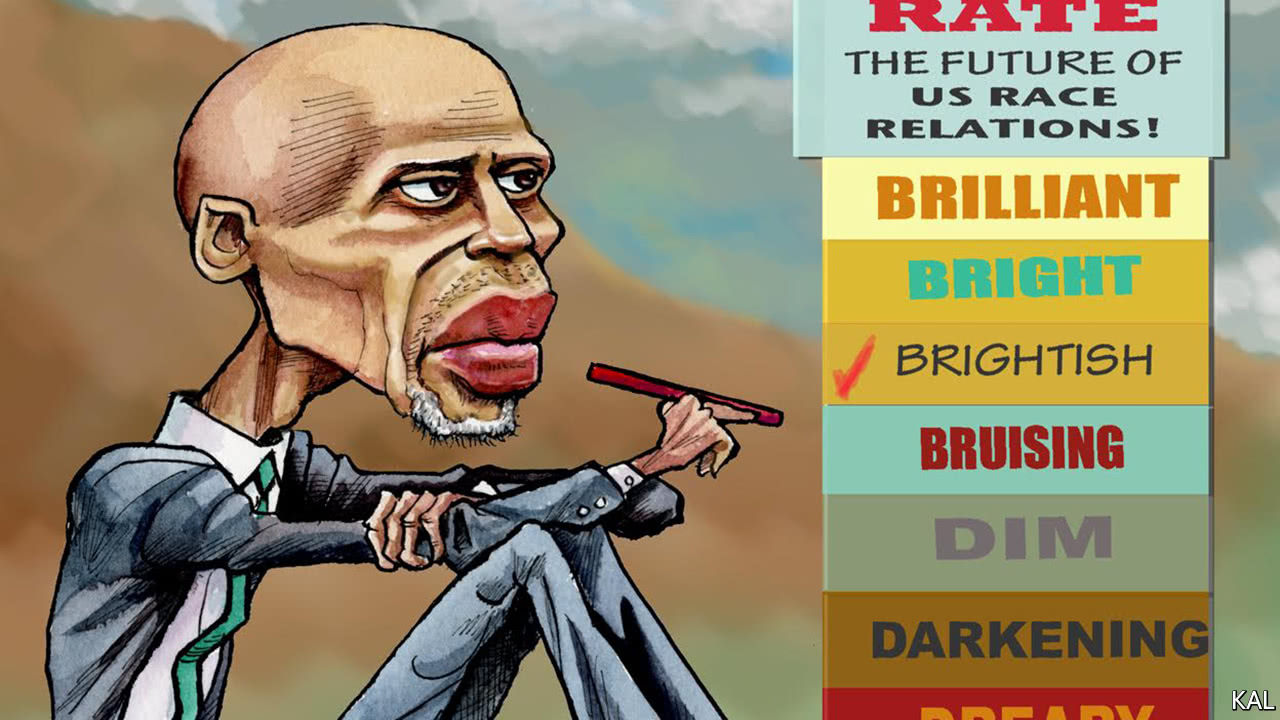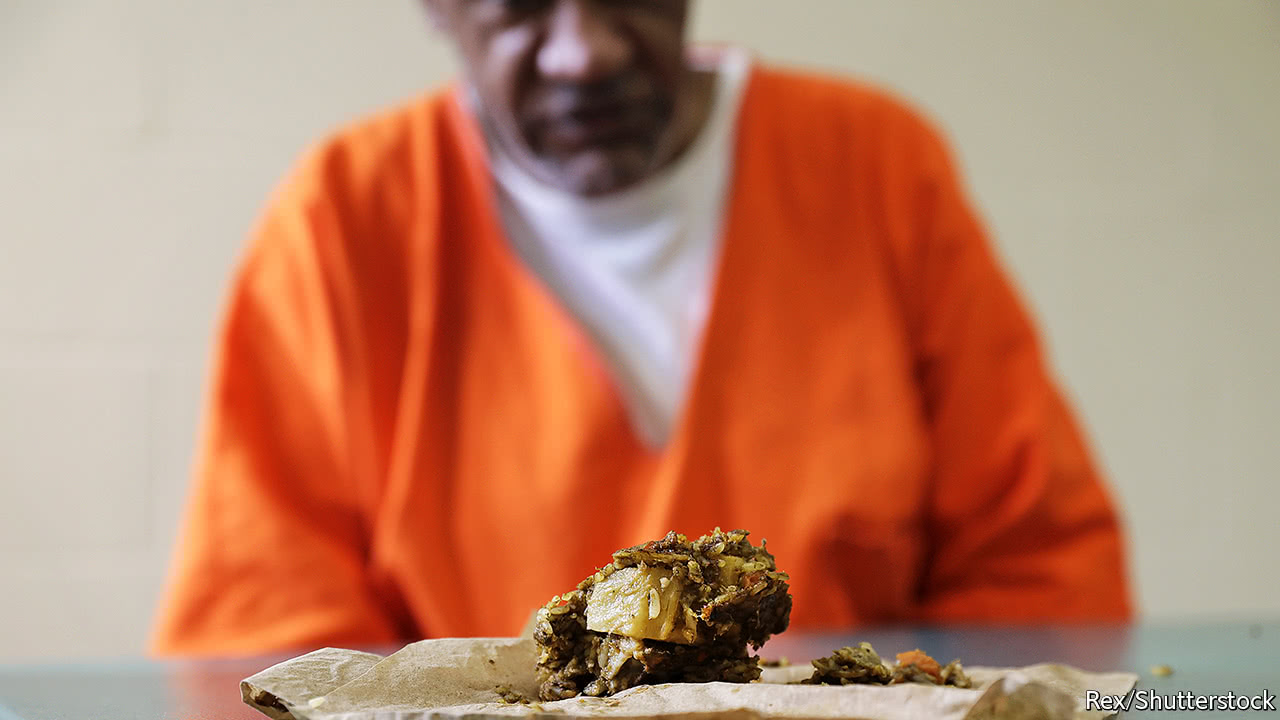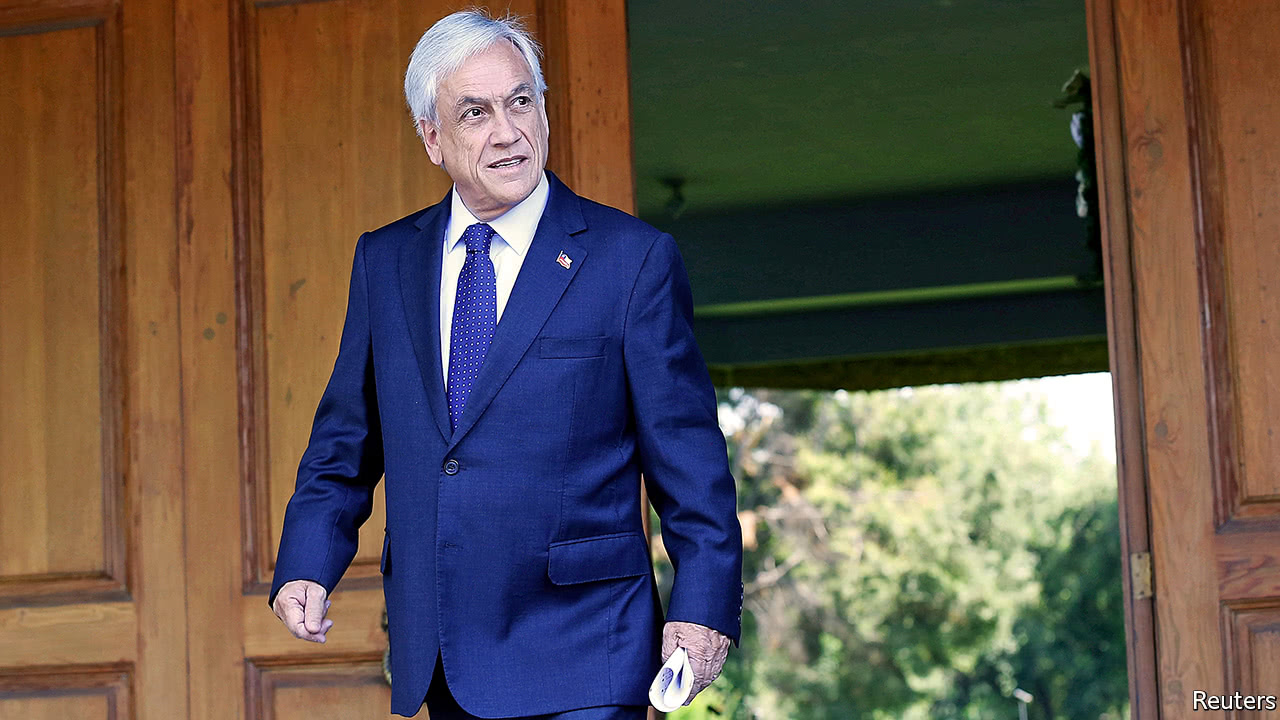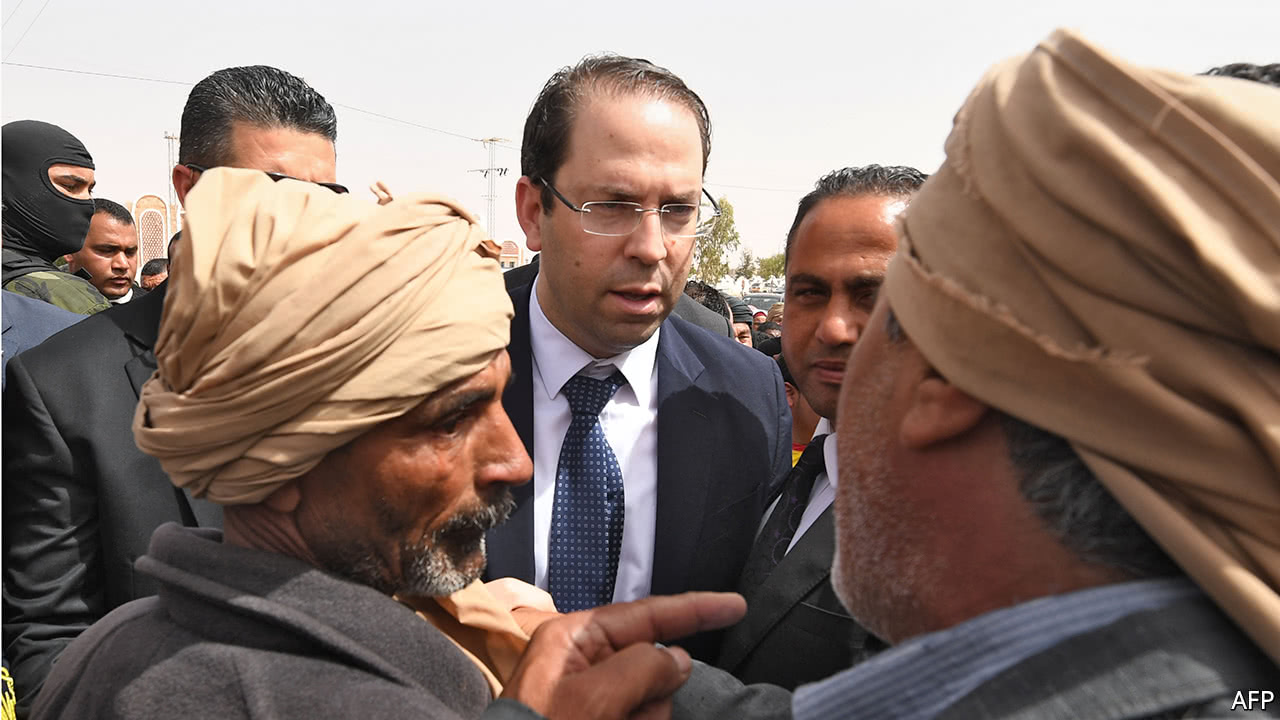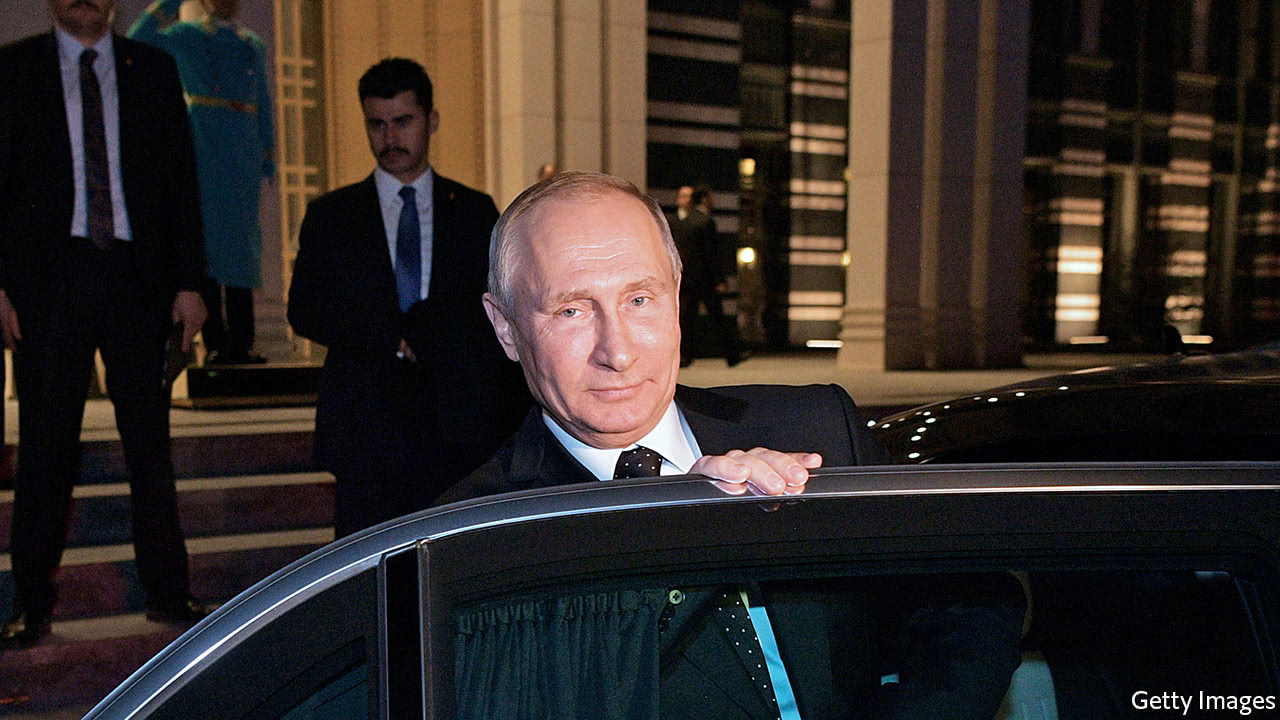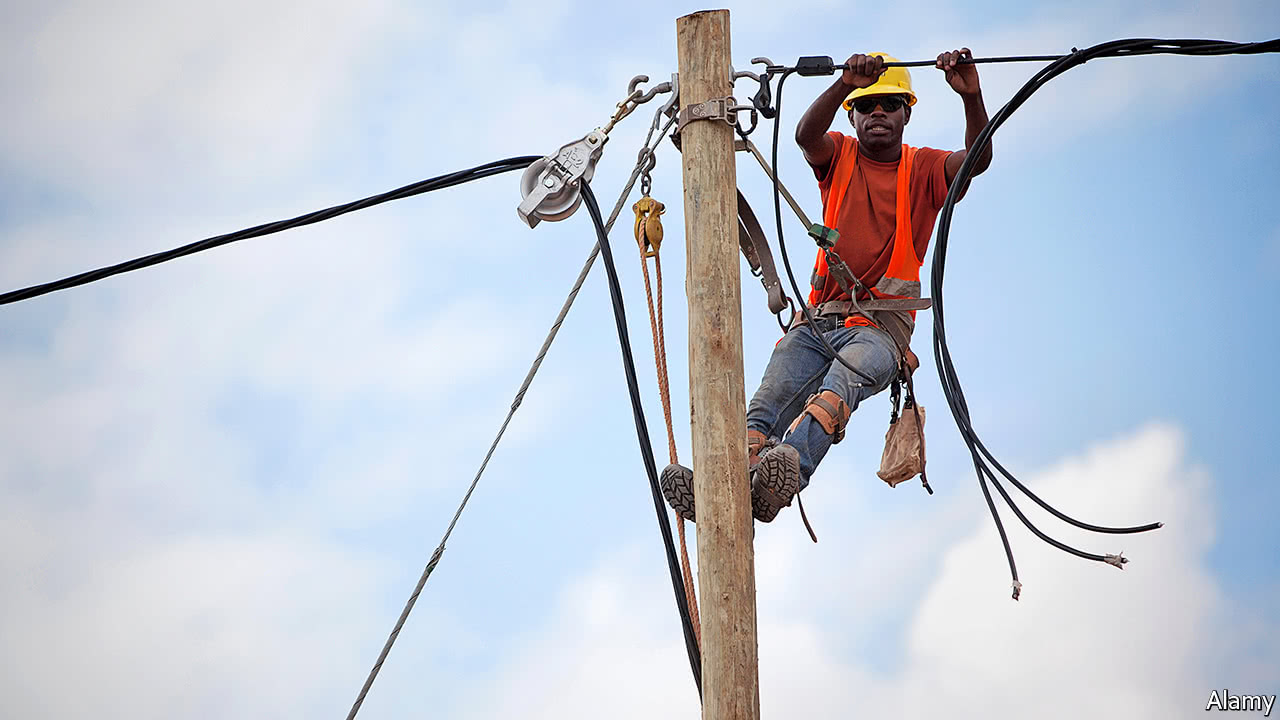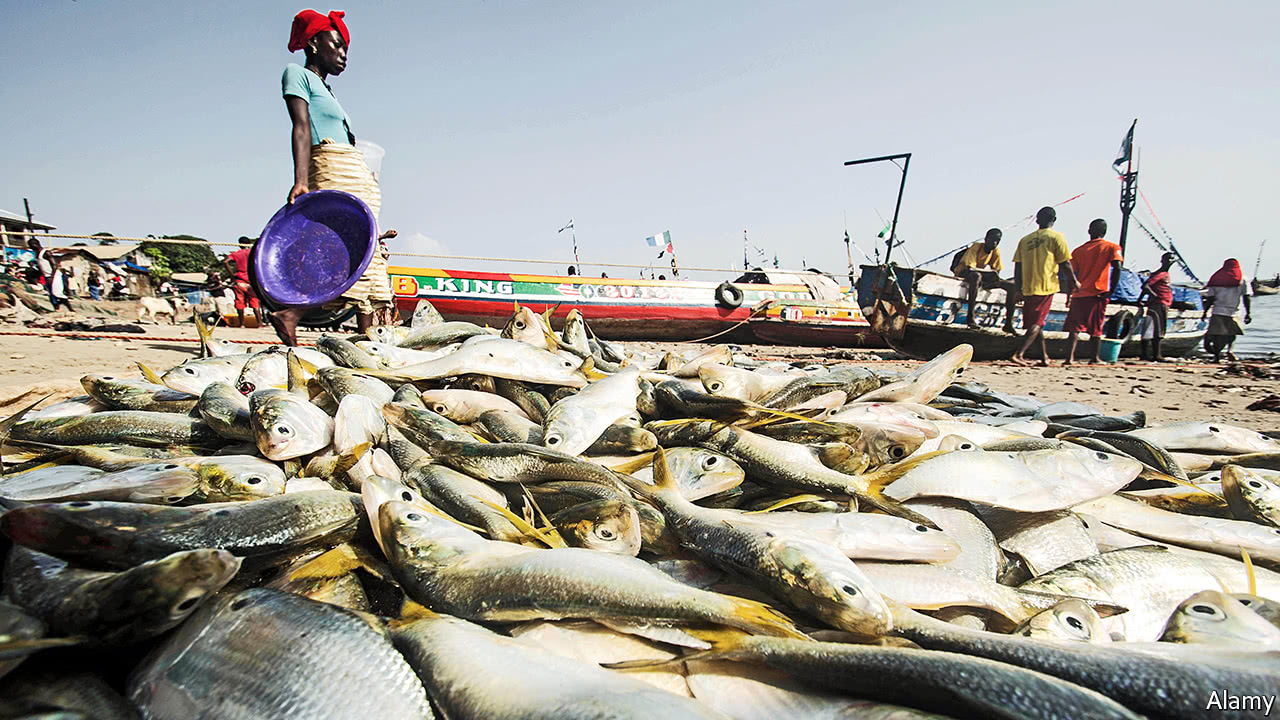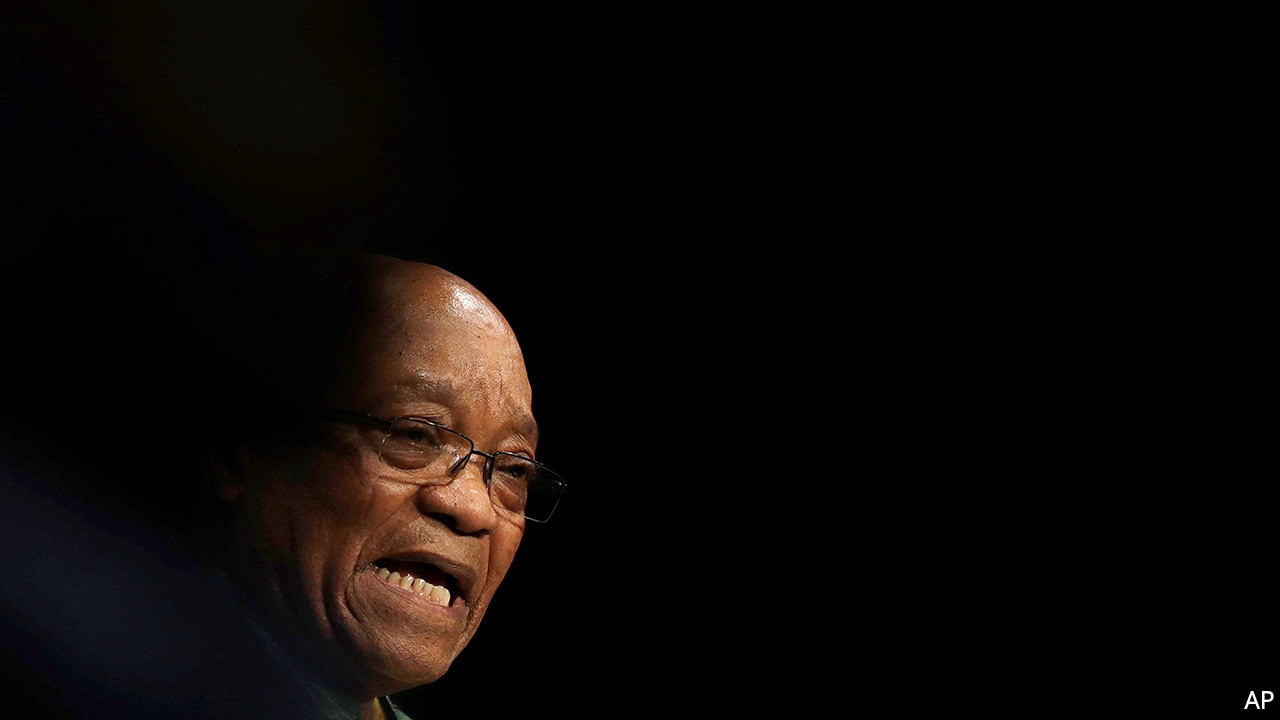Friday 29 December 2017
For Tesla, Deliver, Don't Promise, in 2018
from WSJ.com: Markets http://ift.tt/2lnME1g
via https://ifttt.com/ IFTTT
Why Bonds Had a Great Year for Doing Nothing
from WSJ.com: Markets http://ift.tt/2liJVHb
via https://ifttt.com/ IFTTT
Italy’s president dissolves parliament
ITALY’S president, Sergio Mattarella, fired the starting pistol on December 28th for a marathon election campaign that may soon have the markets fretting again about Europe and the euro.
After a meeting with the prime minister, Paolo Gentiloni (pictured), the president dissolved parliament. The election is set for March 4th.
The dissolution killed off one of the most passionately disputed bills to be tabled since the last general election in 2013. The proposed law would have given citizenship automatically to children born in Italy to immigrants.
Approval of the bill would have helped make Italy’s second-generation immigrants feel welcome in the country they regard as home. But the idea that italianità is a genetic inheritance is deeply rooted in the national psyche: an opinion poll this month found less than half of respondents supported the proposed law.
Mr Gentiloni promised to reintroduce the bill in the next parliament. But by then the government may have a very different complexion. The prime minister leads a broad coalition in which the centre-left Democratic Party (PD) is the dominant partner. But the PD has recently fallen sharply in the polls to below 25% and will face competition for the left-wing vote from Liberi e Uguali, a new, more radical formation headed by the former Senate speaker and chief anti-mafia prosecutor, Pietro...Continue reading
from Europe http://ift.tt/2zLDnFh
via https://ifttt.com/ IFTTT
Thursday 28 December 2017
Why A Stronger Dollar Could Spoil the Emerging-Market Party
from WSJ.com: Markets http://ift.tt/2CeS8FX
via https://ifttt.com/ IFTTT
The Winners and Losers of the Heard's Stock-Picking Event
from WSJ.com: Markets http://ift.tt/2C3qYT7
via https://ifttt.com/ IFTTT
Apple's Nearly Trillion-Dollar iPhone
from WSJ.com: Markets http://ift.tt/2zHUYOm
via https://ifttt.com/ IFTTT
Wednesday 27 December 2017
Emerging Markets: Growing in Maturity?
from WSJ.com: Markets http://ift.tt/2E2cKPK
via https://ifttt.com/ IFTTT
Why Volvo Cars' Chinese Owner Is Betting Big on Volvo Trucks
from WSJ.com: Markets http://ift.tt/2BY8CTD
via https://ifttt.com/ IFTTT
What Can Dislodge Tencent as King of the Videogames?
from WSJ.com: Markets http://ift.tt/2BGNVr3
via https://ifttt.com/ IFTTT
What's Good for Reliance Could Be Good for India
from WSJ.com: Markets http://ift.tt/2pJxOI2
via https://ifttt.com/ IFTTT
Tuesday 26 December 2017
Is This as Good as It Gets for Retailers?
from WSJ.com: Markets http://ift.tt/2DTh186
via https://ifttt.com/ IFTTT
The Next Deal Target in Health Care
from WSJ.com: Markets http://ift.tt/2zyRaPv
via https://ifttt.com/ IFTTT
China's Bid to Dominate Oil Pricing Will Fail
from WSJ.com: Markets http://ift.tt/2C5dxil
via https://ifttt.com/ IFTTT
Investors Diving Into Risky Bank Bonds
from WSJ.com: Markets http://ift.tt/2DdxYt2
via https://ifttt.com/ IFTTT
Don't Expect Plain Sailing For Emerging Markets in 2018
from WSJ.com: Markets http://ift.tt/2BOpCvA
via https://ifttt.com/ IFTTT
Monday 25 December 2017
Games Companies Play, Tax-Cut Edition
from WSJ.com: Markets http://ift.tt/2BPtJaM
via https://ifttt.com/ IFTTT
Chip Makers Aren't Stacking Bets on Cryptocurrencies
from WSJ.com: Markets http://ift.tt/2pwzJPO
via https://ifttt.com/ IFTTT
Sunday 24 December 2017
Apple Changes Business of Selling Your Browsing Data
from WSJ.com: Markets http://ift.tt/2pqtjBV
via https://ifttt.com/ IFTTT
Friday 22 December 2017
The death of Cardinal Bernard Law brings back painful memories for Bostonians
CARDINALS and bishops in white mitres flanked the casket of Cardinal Bernard Law when Pope Francis solemnly blessed it. The pope spared no pomp during the funeral mass for the former archbishop of Boston, which was celebrated in St Peter’s Basilica in the Vatican on December 21st. In Latin, he prayed that Cardinal Law “be given a merciful judgment...freed from punishment, reconciled to the Father...deserve to enter fully into everlasting happiness”.
Plenty of people in Boston believe that the cardinal does not deserve any of that, never mind the fancy Vatican funeral.
Cardinal Law, who died on December 20th, resigned in disgrace in 2002 after the Boston Globe, a newspaper, exposed the sexual abuse of hundreds of children at the hands of priests who were systematically protected by the diocese. For years the cardinal knowingly transferred abusive priests to new parish posts where they continued to have access to children. He did not tell the police or his congregants. In 2003, the Massachusetts attorney-general...Continue reading
from United States http://ift.tt/2l0kQ2R
via https://ifttt.com/ IFTTT
How Buying the Dips Made Them Disappear
from WSJ.com: Markets http://ift.tt/2l0VjGy
via https://ifttt.com/ IFTTT
Burgundy vs. Bordeaux: Holiday Guide to Wine Investing
from WSJ.com: Markets http://ift.tt/2DwqWAf
via https://ifttt.com/ IFTTT
Catalonia’s separatists are re-elected by a whisker
AFTER the momentous events of the past few months in Catalonia, the regional election on December 21st suggests that, remarkably, not much has changed. A record turnout of 83% of the electorate of 5.5m has delivered a parliament with a narrow majority of separatists, just what it had been before it was dissolved.
That is bad news for Mariano Rajoy, Spain’s prime minister, and his efforts to keep his country together. True, in a symbolic blow to the cause of Catalan independence, Ciudadanos, a centre-right anti-nationalist party, became the largest political force, albeit with only 25% of the vote. On the other hand, the list of Carles Puigdemont, the fugitive regional president, outpolled Esquerra (Republican Left), the party of his jailed former coalition partner, Oriol Junqueras. Widely written off a month ago, Mr Puigdemont is perhaps the biggest winner of the election, and will demand his reinstatement as president.
Mr Rajoy called the vote after intervening to suspend...Continue reading
from Europe http://ift.tt/2BP4KB4
via https://ifttt.com/ IFTTT
The European Commission takes a gamble on Poland
POLAND’S quarrels with the European Union are rich and varied. They cover, among other things, refugees, the treatment of media and logging in ancient forests. But it is the Polish government’s systematic assault on the country’s courts that arouses the deepest anxieties in Brussels. Today those concerns found their most serious expression yet, when the European Commission, the executive arm of the EU, opened proceedings against the Polish government under Article 7.1 of the EU treaty. Announcing the decision Frans Timmermans, the commission’s first vice-president, said that in the past two years Polish authorities had adopted at least 13 laws affecting the judiciary, covering ordinary courts, the constitutional tribunal, the Supreme Court and the body that selects judges. These changes, said Mr Timmermans, had rendered the independence of the judiciary “completely moot”. The EU’s 27 remaining governments must now take up the issue.
The EU has long struggled to respond to...Continue reading
from Europe http://ift.tt/2BVwVRb
via https://ifttt.com/ IFTTT
Thursday 21 December 2017
Alzheimer's Setback Is Warning to Biogen Investors
from WSJ.com: Markets http://ift.tt/2BXJaNl
via https://ifttt.com/ IFTTT
Time for Swiss Watchmakers to Take Apple Seriously
from WSJ.com: Markets http://ift.tt/2BheNxS
via https://ifttt.com/ IFTTT
How the Fannie and Freddie Dustup May End
from WSJ.com: Markets http://ift.tt/2BUk4yO
via https://ifttt.com/ IFTTT
Tax Bill Makes 2018 the Year of the Deal
from WSJ.com: Markets http://ift.tt/2Dnc9Ip
via https://ifttt.com/ IFTTT
Supreme Court justices may give away their votes with their voices
THE JUSTICES don black robes, sit impassively during State of the Union addresses and steer clear of Twitter for a reason: the Supreme Court is supposed to be a dispassionate tribunal untainted by politics or emotion. In 2016, a study by Ryan Black and three fellow political scientists found that Supreme Court justices frown on emotionally charged language in legal briefs. Words like “glorious” and “outrageous” seldom persuade, the researchers found; measured language more often wins the day. An aversion to over-the-top language from lawyers’ pens does not mean the justices conduct themselves with robotic stoicism, however. A new paper shows that it may be possible to predict the outcome of a case by listening carefully to the pitch of the justices’ voices during oral arguments.
When justices question a lawyer at a higher-than-usual pitch, that lawyer's side is likely to...Continue reading
from United States http://ift.tt/2z9Kes1
via https://ifttt.com/ IFTTT
Big Tech Unlikely to Blow its Tax Bonus
from WSJ.com: Markets http://ift.tt/2oVAbXu
via https://ifttt.com/ IFTTT
Risky Plan to Keep London as Europe's Financial Hub
from WSJ.com: Markets http://ift.tt/2DhsmhZ
via https://ifttt.com/ IFTTT
Stitch Fix Investors Sing Blue Apron Blues
from WSJ.com: Markets http://ift.tt/2oVA3Hu
via https://ifttt.com/ IFTTT
Wednesday 20 December 2017
Tax reform has passed. What now?
THE tax bill initiated by the Republican party completed its journey through America’s Congress on December 20th. The bill is President Donald Trump’s first major legislative accomplishment, and America’s first significant tax reform since 1986. Once Mr Trump signs it into law, America’s tax system will change in numerous ways. Its corporate tax will become “territorial”, like those of most other rich countries. As a result, firms will no longer pay taxes on their overseas profits. At home, the corporate tax rate will fall from 35% to 21% in 2018. Workers will benefit from across-the-board cuts in income taxes until 2025, after which, if Congress takes no further action, most levies for individuals will return to today’s levels or even rise.
The final bill first passed the House of Representatives on December 19th. But Democrats’ parliamentary jockeying forced the House to vote again, after parliamentary problems were found with three of the bill’s provisions. In the final vote, the bill passed the House by 224 votes to 201....Continue reading
from United States http://ift.tt/2DjNFzK
via https://ifttt.com/ IFTTT
Micron Calms Fears of Memory Chip Downturn
from WSJ.com: Markets http://ift.tt/2BzsoRU
via https://ifttt.com/ IFTTT
The One Tax Change That Really Bites Businesses
from WSJ.com: Markets http://ift.tt/2B0FQNv
via https://ifttt.com/ IFTTT
A Massive Margin Loan That Went Really Wrong for Banks
from WSJ.com: Markets http://ift.tt/2BL5A4b
via https://ifttt.com/ IFTTT
Best Buy v. Amazon: Holiday Edition
from WSJ.com: Markets http://ift.tt/2AZwvFQ
via https://ifttt.com/ IFTTT
Tuesday 19 December 2017
Why the Palestinians have never felt so despondent
EVEN by the standards of the peace process, this may be a new low. President Donald Trump’s advisers have spent the past year shuttling between Israelis and Palestinians. The administration is close to unveiling a peace plan, but its work has already lapsed into what the White House calls a “cooling-off period”. When Mike Pence, America’s vice-president, visits the Middle East in January, he is unlikely to be received by a Palestinian leader. The latest round of talks may be over before it begins.
The cause is Mr Trump’s decision on December 6th to recognise Jerusalem as Israel’s capital, while ignoring Palestinian claims to the city. The announcement has undermined America’s contention that it is a fair mediator. But it has also highlighted the decrepit state of the Palestinian national movement. Protests against the decision were relatively small—only a few thousand Palestinians turned out at their peak. Eight Palestinians...Continue reading
from Middle East and Africa http://ift.tt/2Bg4mOU
via https://ifttt.com/ IFTTT
One year after a massacre in Uganda, a king faces trial
THE palace gates are locked, but the bullet holes remain. It is a year since the Ugandan army and police raided the compound of the Rwenzururu king in the western town of Kasese. More than 100 people were killed, the bloodiest incident in the country for more than a decade. The king, Charles Wesley Mumbere, and nearly 200 people were arrested; they still await trial, on charges including murder, terrorism and treason. “The situation is only calm on the surface,” says Geoffrey Madebeya, a local councillor. “Inside, we have tears.”
The Bakonzo people, the main ethnic group in Kasese, straddle the vertiginous borderland between Uganda and the Democratic Republic of Congo, in the Rwenzori mountains. It is here, the Ugandan government alleges, that Bakonzo radicals want to carve out an independent kingdom. The king denies this, but people in these parts have long felt marginalised by the state. Deadly violence erupted in 2014 after groups of young Bakonzo men attacked police and army...Continue reading
from Middle East and Africa http://ift.tt/2yZtgMS
via https://ifttt.com/ IFTTT
Cyril Ramaphosa could save South Africa—if he can reform his own party
HIS broad grin, and his rival’s grimace, heralded the big news. On December 18th Cyril Ramaphosa became the new leader of the African National Congress (ANC) and thus its candidate in the next South African presidential election. He will surely take over when President Jacob Zuma’s second term expires in 2019—or even sooner.
Mr Ramaphosa is a former trade union boss and anti-apartheid campaigner. He was once tipped to succeed Nelson Mandela, but the party picked Thabo Mbeki instead and Mr Ramaphosa spent the next several years making money. This time he campaigned more effectively, defeating Mr Zuma’s preferred successor (and ex-wife), Nkosazana Dlamini-Zuma.
The result was uncomfortably close. Mr Ramaphosa won by fewer than 200 votes out of nearly 5,000 cast at the ruling ANC’s five-yearly elective conference. Had the courts not kicked out more than 400 delegates, many of whom supported Ms Dlamini-Zuma, after finding irregularities in their selection, the Zuma dynasty might...Continue reading
from Middle East and Africa http://ift.tt/2BfWahN
via https://ifttt.com/ IFTTT
Have yourself a dismal Christmas
ONLY an economist would think to ask whether Christmas is efficient. In 1993 Joel Waldfogel, then a professor at Yale University, turned a lunchtime conversation with colleagues into a paper entitled “The deadweight loss of Christmas”, which argued that, no, it is not. That gift-giving might actually be bad is the kind of opinion which breeds a deep mistrust of economists—loathing is perhaps too strong—among those not schooled in the dismal science. It is also just the sort of analytical insight on which economists pride themselves: counterintuitive, irreverent and interesting. But they should perhaps be less pleased with themselves. The way they think about the most festive time of the year reveals something important about the shortcomings of the field’s approach to human behaviour.
Mr Waldfogel’s notion was a clever one. Massive amounts of money are spent on holiday presents; it makes sense to ask whether such spending leaves the world better off. In buying gifts, people do their best...Continue reading
from Economics http://ift.tt/2BKxRI7
via https://ifttt.com/ IFTTT
Countries rarely default on their debts
VENEZUELA is an unusual country. It is home to the world’s largest reserves of oil and its highest rate of inflation. It is known for its unusual number of beauty queens and its frightening rate of murders. Its bitterest foe, America, is also its biggest customer, buying a third of its exports.
In defaulting on its sovereign bonds last month (it failed to pay interest on two dollar-denominated bonds by the end of a grace period on November 13th), Venezuela is also increasingly unusual. The number of governments in default to private creditors fell last year to its lowest level since 1977, according to the Bank of Canada’s database. Of the 131 sovereigns tracked by S&P Global, a rating agency, Mozambique is the only other country in default, having missed payments on its Eurobond (and failed to make good on guaranteed loans to two state-owned enterprises). Walter Wriston, a former chairman of Citibank, earned ridicule for once declaring that “countries don’t go bust”. But they don’t...Continue reading
from Economics http://ift.tt/2BN4sx8
via https://ifttt.com/ IFTTT
Intangible assets are changing investment
WHEN you work as an equity analyst at an investment bank, your task is clear. It is to comb all the statements made by corporate executives, to scour the industry trends and arrive at an accurate forecast of the company’s profits. Achieve this and your clients will be happy and your bonus cheque will have many digits.
But is all this effort worthwhile? Not as much as it used to be, according to Feng Gu and Baruch Lev, writing in a recent issue of Financial Analysts Journal*. The authors imagined that investors could perfectly forecast the next quarter’s earnings for all companies. They then assumed that investors bought all the stocks that they expected to meet or beat the consensus of analysts’ forecasts; and that investors could short (ie, bet on a declining price) the stocks of those that were predicted not to reach their estimates. They made their investment two months before the end of a quarterly reporting period and got out of their positions one month after the...Continue reading
from Economics http://ift.tt/2BMR2ks
via https://ifttt.com/ IFTTT
Latin America’s biggest scandal threatens to snare Peru’s president, too
SINCE narrowly winning Peru’s presidential election in June 2016, Pedro Pablo Kuczynski has had it tough. His centre-right Peruvians for Change party holds only 18 of the unicameral congress’s 130 seats. Popular Force, led by his defeated opponent, Keiko Fujimori, boasts 71. It has censured the president’s ministers and thwarted his legislative plans, such as an effort to reform Peru’s corrupt and inefficient judiciary. It was just waiting for an excuse to go after Mr Kuczynski himself.
One presented itself on December 13th, when evidence emerged detailing payments of $780,000 between 2004 and 2007 to Westfield Capital, a Florida-registered firm Mr Kuczynski founded in the 1990s, made by Odebrecht, a Brazilian construction giant which had bribed its way to government contracts across Latin America. He had repeatedly denied any ties to Odebrecht, including to a congressional committee. So on December 15th congress summarily voted by 93 to 17 to launch impeachment proceedings...Continue reading
from Americas http://ift.tt/2yYCKI6
via https://ifttt.com/ IFTTT
Making Saskatchewan great again
WHEN it comes to erecting barriers, Brad Wall lives up to his name. On December 6th the premier of Saskatchewan banned lorries registered in neighbouring Alberta from new government-backed roadworks in his province. When a week later Alberta complained that this violated an interprovincial trade deal, Mr Wall thundered: “We won’t be backing off.” Saskatchewanians faced similar discrimination in Alberta, he said.
In theory Canada’s ten provinces and three territories form a vast single market where goods, services and people move freely. Yet provincial leaders find ways to protect their workers and businesses against rivals next door. Before 2008 Quebec banned yellow margarine, lest its shoppers mistake the grain-based spread (shipped in from the west) for proper butter (churned by its own dairy farmers). In 2012 a man from New Brunswick was arrested and fined for bringing alcohol back home from Quebec, violating a provincial prohibition on booze sold outside state-owned liquor stores; his...Continue reading
from Americas http://ift.tt/2Bgkv7d
via https://ifttt.com/ IFTTT
The Swabian village with a Michelin star for every 2,000 people
OBLIVIOUS to the Saturday evening clatter in his kitchen, Jörg Sackmann furrows his brow in concentration. “Foam!” he commands, teasing strands of onion into a loop and spooning a warm egg yolk into the centre. A young saucier pours a pan of bubbles around the edge of this “onion carbonara”. Peering intensely through half-moon glasses, Mr Sackmann sprinkles on black pepper: “not too much and not too little”.
In 2014 such dishes won Mr Sackmann his second star in the Michelin Guide, the gastronome’s bible. Along with two three-star restaurants at the neighbouring hotels Bareiss and Traube Tonbach, this took his south-west German village of Baiersbronn to a total of eight stars. London has about one star for every 100,000 people; Paris one for every 16,000. This quiet corner of the Black Forest has one for every 2,000.
The secret is balance. Baiersbronn is just provincial enough. Poor soil and...Continue reading
from Europe http://ift.tt/2oOh021
via https://ifttt.com/ IFTTT
Mr Putin will win next year despite, not because of, the economy
STANDING on stage at the Gorky Automobile Plant in Nizhny Novgorod in early December, flanked by factory workers in blue jackets, Vladimir Putin spoke of the region’s history. After volunteers from Novgorod helped 17th-century Moscow overcome the Time of Troubles, the president said, “the united, centralised and powerful Russian state began to develop rapidly.” He called upon the car workers to continue in the same tradition. “With the active participation of people like you,” he declared, “Russia will keep moving forward.” They in turn called upon Mr Putin to announce his candidacy in next year’s presidential election then and there. “Everyone in this audience, without exception, supports you,” said a worker. He duly obliged—surprising no one.
On the economic front, the Russian automobile is indeed moving forward again, if slowly. After two grinding years of recession, the economy will grow in 2017. Adept policy responses helped stabilise the situation following the dual...Continue reading
from Europe http://ift.tt/2D584YW
via https://ifttt.com/ IFTTT
How Belgium copes with returning Islamic State fighters
LAST month a court in the Netherlands convicted a 22-year-old Dutch woman of helping to plan terrorism. It then set her free. Laura H. (her last name is protected under Dutch law), a Muslim convert, had moved to territory controlled by Islamic State (IS) with her Palestinian-Dutch husband in 2015, hoping to find a theocratic paradise. Quickly disillusioned, she spent a year planning her escape with the help of her father back home. The plan went wrong. As recounted by Thomas Rueb, a Dutch journalist, Laura and her children were nearly killed in a firefight before stumbling into the hands of Kurdish soldiers. The court ruled that by moving to IS-held territory with her husband she had aided terrorism, but found her 11 months of pre-trial detention to be enough.
Laura is one of about 5,000 residents of the European Union who have gone to Iraq and Syria since 2014 as jihadist fighters or supporters. Over the past six months, as IS has collapsed, Europe has braced for the prospect of more...Continue reading
from Europe http://ift.tt/2Bg9gvC
via https://ifttt.com/ IFTTT
A new coalition in Austria brings the far right in from the cold
IT IS a measure of populism’s rise that the announcement of a coalition deal between the centre-right Austrian People’s Party (ÖVP) and the right-wing Austrian Freedom Party (FPÖ) on December 16th caused barely a ruffle. When the two last formed a government, back in 2000, the news provoked diplomatic sanctions: visits and meetings were cancelled. No longer exceptional, Austria faces no sign of any such quarantine in Europe today.
To be sure, there are concerns in Berlin and Brussels. The FPÖ, which has a “co-operation agreement” with Vladimir Putin’s United Russia party and is close to the autocratic leaders of Hungary and Poland, will henceforth run Austria’s foreign, interior and defence ministries—and with them the country’s diplomatic and security services. But this is a shift of degree, not direction: the Alpine republic has long been doveish on Russia and closer to the central Europeans than to Angela Merkel...Continue reading
from Europe http://ift.tt/2yZ1UGE
via https://ifttt.com/ IFTTT
There are no good options for dealing with Poland’s government
AMONG the many delights of Christmas Eve (Wigilia) in Poland is the custom of setting an empty place for an unexpected friend, relative or stranger who happens to drop in. The tradition is grounded, depending on whom you ask, in Biblical practice, remembrance of deported compatriots in war or pagan ancestor-worship. It emerged centuries ago, but survives at many carp-laden Wigilia tables across the world.
Inside the European Union, though, Poland’s populist-nationalist government is coming close to empty-chairing itself. Driven by the views of its leader, Jaroslaw Kaczynski, the ruling Law and Justice (PiS) party has spent two years sucking the independence from public institutions in a bid to reverse perceived wrongs of the post-1989 settlement. The European Commission, which as the guardian of EU treaties monitors such things, has spent the same period impotently wringing its hands. Having already defanged the constitutional tribunal,...Continue reading
from Europe http://ift.tt/2oLpx5A
via https://ifttt.com/ IFTTT
India faces growing competition with China in its own backyard
EARLIER in December Wang Yi, the Chinese foreign minister, said his country “disapproves” of spheres of influence in international affairs. He was speaking in Delhi, India’s capital, a fact that underscored a point China is making increasingly clear by other, less diplomatic means: the thing it really disapproves of is India maintaining a sphere of influence.
Separated from the rest of Asia by the world’s biggest mountains, India is the elephant on its own subcontinent. Leaving aside perennially hostile Pakistan, it has effortlessly dominated smaller neighbours much in the way that America does in the Caribbean: they may grumble and resent their sometimes clumsy big brother, but they have learned to stay out of its way. Lately, however, China’s increasingly bold advances are challenging India’s sway.
Consider the past few weeks. On December 9th Sri Lanka granted a 99-year lease of a strategic port on its southern coast to a company controlled by the...Continue reading
from Asia http://ift.tt/2BgkeBd
via https://ifttt.com/ IFTTT
Cambodia is systematically squashing all forms of dissent
“THE logical approach now”, reckons Naly Pilorge of LICADHO, a Cambodian human-rights watchdog, “would be to continue attacking.” She is talking about a crackdown on all forms of political dissent launched in August by Hun Sen, who has been prime minister for 32 years and says he intends to remain in the job for another decade. Not content with securing a ban on the main opposition party, he is now persecuting unions, NGOs and anyone else who criticises the government.
The scale of the crackdown is unprecedented, says Ou Virak, a political analyst who once worked at the Cambodian Centre for Human Rights, which the government recently threatened to close. Gatherings of more than five people are banned. All non-governmental groups and associations need to notify local officials before organising any kind of activity, according to a directive from the Ministry of the Interior disseminated in October.
Legislation on...Continue reading
from Asia http://ift.tt/2yXglLf
via https://ifttt.com/ IFTTT
The Communist Parties of China and Vietnam do not get on
ONCE upon a time the Communist Parties of China and Vietnam were staunch comrades in the proletarian struggle. Mao Zedong thickened ties by helping Ho Chi Minh in his anti-colonial fight against the French and Americans, providing both military equipment and advice on communist discipline and ideology. Capitalism has transformed both countries in ways that would have shocked the two revolutionaries. Yet both parties have survived against the odds, running Leninist dictatorships while overseeing rapid economic growth. They are far and away the most successful of the world’s remaining communist states, easily eclipsing shabby Cuba, tiny Laos and militant North Korea.
It is not just in embracing free markets that Vietnam has mimicked China. Under Xi Jinping, the Chinese Communist Party has centralised authority and clamped down on dissent. Observers wonder whether the party in Vietnam isn’t starting to follow suit. A harder line was signalled at the last five-yearly congress, in early 2016. The...Continue reading
from Asia http://ift.tt/2BgkjF1
via https://ifttt.com/ IFTTT
America’s school funding is more progressive than many assume
IN 1647, the Massachusetts Bay Colony passed a law mandating the establishment of publicly funded schools. Puritans were worried that otherwise children would fail to learn the Bible and become susceptible to the wiles of “that old deluder, Satan”. To pay for the schools, the colony levied a tax on local dwellings.
Although the aims of public schooling have changed since the 17th century, the critical role of property taxation in funding education has endured. The share of school funding that comes from local taxes such as levies on property is twice as high in America as in the rest of the OECD club of mostly rich countries. It is an approach with many critics, who argue that children who need the most help in school in fact receive the least, since they live in areas with cheap housing and correspondingly small tax takes. Arne Duncan, Barack Obama’s first education secretary, once said that the use of property taxes was the main cause of the country’s “inequitable school...Continue reading
from United States http://ift.tt/2BfPZdB
via https://ifttt.com/ IFTTT
Kareem Abdul-Jabbar, a brooding sportsman-sage
ADDRESSING the Democratic National Convention in Philadelphia in 2016, Kareem Abdul-Jabbar sounded uncharacteristically optimistic. “Those who think Americans scare easily enough to abandon our country’s ideals…underestimate our resolve,” said the former basketball player, betraying, as he stooped over the podium, his unconscious habit of trying to make his seven-feet, two-inch (2.18m) frame less conspicuous. Now hunched behind a table in his office in Los Angeles, Mr Abdul-Jabbar, who scored over 38,000 points in the National Basketball Association, a record never surpassed, says he enjoyed the experience. It was the first appearance at a party confab by anyone in his family since his father, a trombonist, accompanied Marilyn Monroe’s rendition of “Happy Birthday, Mr President” in 1962. He also cracked the convention’s best joke—introducing himself as “Michael Jordan”, on the basis that “Donald Trump couldn’t tell the difference.”
Yet Mr Abdul-Jabbar, who has probably...Continue reading
from United States http://ift.tt/2yYmJlm
via https://ifttt.com/ IFTTT
The awful state of prison food
MOST recipes aim at deliciousness. With nutraloaf (also spelt nutriloaf) the aim is to be as revolting as possible. It is made in prisons by baking leftovers and whatever else is to hand into a loaf, meeting minimum calorific and nutritional requirements. The ingredients vary. The Florida Department of Corrections recommends a basic mix of carrots and spinach, dried beans, vegetable oil, tomato paste, water, grits and oatmeal.
People who get past the smell describe the taste as bland. It looks like a lump of shredded, dried slop. One of the side effects is severe constipation. It is served three times daily without utensils, usually for no more than ten days as an extra punishment for prisoners who are already being held in isolation.
Prisoners, whose culinary expectations are already pretty low, often find it so disgusting that they stop eating for days rather than consume it. Decisions about its use are made capriciously, even by...Continue reading
from United States http://ift.tt/2BgaWVR
via https://ifttt.com/ IFTTT
The rise of long-distance marriage
THE Callahans, Karen and Kevin, got married in 1973 when they were college students in Des Moines, Iowa. Forty years, two children and umpteen moves across the country later, they put down roots. Karen took a job in Durham, North Carolina, while Kevin stayed in Parkville, Missouri, where he could be close to relatives and prepare their home for retirement. They see each other at least once a month, for birthdays, holidays and mini-breaks. They look forward to their phone calls, almost every night at around nine.
About 3.9m married Americans aged 18 and over live apart from their spouses, up from around 2.7m in 2000. That number comes with some caveats, says Jonathan Vespa, a demographer with the US Census Bureau. Some of those people, like the Callahans, may be party to a commuter marriage. Others may be living apart, against their wishes, from spouses who are incarcerated, in nursing homes or serving in the armed forces. “We know it’s increasing,” says Danielle Lindemann, a...Continue reading
from United States http://ift.tt/2yZk3Ei
via https://ifttt.com/ IFTTT
What the elections of 2017 say about 2018
ON DECEMBER 12th, as Alabamans headed to the polls to choose a new senator, Tawanna Dunagan stood on Graymont Avenue in downtown Birmingham holding up a Doug Jones sign, exhorting passers-by to vote for the Democratic candidate. She had opted for Alabama Democrats in past elections, but 2017, she said, felt different: “People out here are voting like Obama’s on the ballot.”
One month earlier Virginia saw turnout hit a 20-year high in its governor’s election, and there too the Democrat (Ralph Northam) won. In fact, although Democrats won just two of the seven special elections to the House and Senate in 2017, they outperformed expectations in all of them. At year’s end they enjoy an 11-point advantage over Republicans on a generic ballot. In Alabama, Donald Trump now has a net favourability rating of zero, despite winning the state by 28 points in 2016. Data such as these suggest that the midterms of 2018 could be a wave election for...Continue reading
from United States http://ift.tt/2Bg0Ap2
via https://ifttt.com/ IFTTT
What the victory of centre-right Sebastián Piñera in Chile’s presidential election means
FOR weeks Chileans had been bracing for a nail-biter. After an inconclusive first round of the presidential election in November, the result of a run-off on December 17th looked uncertain. In the end it wasn’t even close. Sebastián Piñera of the centre-right Chile Vamos (Let’s Go Chile) coalition trounced his centre-left rival, Alejandro Guillier, a senator and former television anchorman, by 55% to 45%. The moderate right has done well of late in South American countries such as Argentina and Brazil, which have become weary of left-wing populism. In Chile Mr Piñera’s victory can be seen as more a vote for continuity than radical change.
In his acceptance speech on the Alameda, the main drag of the capital, Santiago, a jubilant Mr Piñera promised unity, dialogue and consensus. Crowds of supporters cheered, but also breathed a sigh of relief. Earlier opinion polls had shown the candidates neck and neck. That might have stirred more of Mr Piñera’s supporters to vote;...Continue reading
from Americas http://ift.tt/2kfXiay
via https://ifttt.com/ IFTTT
The Flawed Bull Case for Bitcoin
from WSJ.com: Markets http://ift.tt/2BdspOC
via https://ifttt.com/ IFTTT
The Climate for Coal Just Got Even Chillier
from WSJ.com: Markets http://ift.tt/2yXfWZn
via https://ifttt.com/ IFTTT
Monday 18 December 2017
Tunisia’s Nobel prize-winning trade unions are holding the country back
RESIDENTS of Tataouine, on the edge of the Sahara, think it ought to be a boomtown. The dusty city is close to Tunisia’s oil and gas reserves. But firms do most of their recruiting elsewhere and send their profits away. The local unemployment rate is more than twice the national average of 13%. In April job-seeking protesters shut the main oil pipeline and briefly halted work on Nawara, a big gasfield. Youssef Chahed, the prime minister, was booed off the stage at a town-hall meeting. So the Tunisian General Labour Union (UGTT), the country’s largest, stepped in to mediate. In June it announced a deal: the state would hire another 3,000 workers from the region.
The concession ended the protests. But it was bad policy. The state oil company is already an inefficient mess. Over the past decade its production has fallen by 29%, even though its workforce has grown by 14%. Under the agreement, the government urged private oil and gas firms to hire 1,500 locals, but they do not need the...Continue reading
from Middle East and Africa http://ift.tt/2oF5K82
via https://ifttt.com/ IFTTT
Vladimir Putin takes a victory lap in the Middle East
EVEN some of Bashar al-Assad’s staunchest opponents cringed at the snub. On December 11th Vladimir Putin made a surprise visit to Khmeimim airbase in Syria, from where the Russian air force launched a bombing campaign against Syrian rebels in 2015. Two years later, most of Mr Putin’s aims have been achieved: Russia’s military bases in the Middle East are secure; Western attempts to isolate Russia have failed; and Mr Assad remains Syria’s president, halting what the Kremlin sees as an American-backed wave of regime change. But when Mr Assad tried to join a photo-op, a Russian officer grabbed him by the arm. The base might be on Syrian soil, but it is Russia’s turf and Mr Putin would lead the victory lap.
From Syria Mr Putin flew to Egypt for talks with its president, Abdel-Fattah al-Sisi. They agreed to resume flights between their countries, which were cut off after the bombing of a Russian airliner over Sinai in 2015. They also moved...Continue reading
from Middle East and Africa http://ift.tt/2CZmgmv
via https://ifttt.com/ IFTTT
More Africans have electricity, but they are using less of it
TOURISTS have long been drawn to Hell’s Gate National Park in Kenya by its steep cliffs, plentiful zebras and spectacular canyons. Recently there is a new attraction; a spa set amid the cliffs, with a huge pool heated by the energy stored in the Earth’s crust. Curiously, it is not run by a tourist company, but by KenGen, the national electricity generator. It abuts the Olkaria geothermal power plants, from which plumes of steam pour into the sky. Since 1982 four power stations have opened here; a fifth is being built and work on a sixth will begin soon. Energy harvested from volcanic heat now provides almost half the power Kenya needs.
Electrification has been one of the country’s great successes over the past few decades. It is not just new generators; the number of people connected to the power network has also soared. According to the Kenya Power and Lighting Company (KPLC), nearly three-quarters of Kenyans are now connected, up from barely a quarter in 2013. The trend in many African...Continue reading
from Middle East and Africa http://ift.tt/2CZm6vp
via https://ifttt.com/ IFTTT
Why Sierra Leone is running out of fish
ONE evening in Tombo, as fish buyers throng the seafront, an argument erupts at the far end of the harbour. Angry voices waft through the air, as Pa Seaport, the master fisherman of Sierra Leone, tries to solve a heated dispute between local fishermen and a South Korean man. They accuse him of damaging their nets with his trawler, which, they say, was heading to an area where fishing is banned.
This squabble points to a much bigger problem. In Sierra Leone nearly half the population does not have enough to eat, and fish make up most of what little protein people get. But the country’s once-plentiful shoals, combined with its weak government, have lured a flotilla of unscrupulous foreign trawlers to its waters. Most of the trawlers fly Chinese flags, though dozens also sail from South Korea, Italy, Guinea and Russia. Their combined catch is pushing Sierra Leone’s fisheries to the brink of collapse.
Sierra Leone is not alone in facing this...Continue reading
from Middle East and Africa http://ift.tt/2kGI1z2
via https://ifttt.com/ IFTTT
Jacob Zuma loses two court cases in one day
THE wheels of justice turn slowly, but probably not slowly enough for South Africa’s scandal-plagued president. Jacob Zuma’s court dates have piled up in recent years, along with seemingly endless appeals in what his allies have termed his “Stalingrad strategy” of contesting every judgment, no matter the futility. On December 13th, in the latest damning decision, a high court ordered Mr Zuma to set up a judicial inquiry into allegations of “state capture” against him, his son Duduzane and their friends. A few hours earlier the court ruled in a separate decision that Mr Zuma had abused the judicial process by trying to block an anti-corruption ombudsman, Thuli Madonsela, from releasing a report on state capture in late 2016. It ordered that Mr Zuma must personally pay the legal fees in both cases.
It is not clear whether Mr Zuma will appeal even these, as he did another judgment a week earlier in which the courts fired his appointee as head of the national prosecutors’...Continue reading
from Middle East and Africa http://ift.tt/2kfFSuL
via https://ifttt.com/ IFTTT
Why is America more tolerant of inequality than many rich countries?
MOST Americans are unenthusiastic about Republicans’ efforts to reward the richest with the biggest tax cuts. In polls taken on the eve of a vote on the government's tax bill in the Senate on December 2nd only between a quarter and a third of voters supported the plan. But in general Americans seem more willing than the inhabitants of other rich countries to tolerate inequality.
Data from the Organisation for Economic Co-operation and Development (OECD) suggests that America is a relatively unequal country and that the government does comparatively little to address this. The most common measure of inequality, the gini coefficient, takes a value between zero—if everyone earns exactly the same— and one—in which all income is earned by one person. America’s gini before taxes and transfers was 0.47 compared to an OECD average of 0.43. After taxes and transfers, America’s gini falls to 0.39. The OECD average is 0.31. In 2014, taxes and transfers reduced American inequality by a mere 18%; this compares to 25% in Britain,...Continue reading
from United States http://ift.tt/2j9IfOJ
via https://ifttt.com/ IFTTT
Subsidising coal production is a really bad idea
ON A brisk early-autumn morning in Welch, seat of the poorest county in America’s third-poorest state, four young men methodically demolish an old car-parts factory. The men wielding sledgehammers are not vandals, but construction trainees hired by Coalfield Development, a local non-profit, and they are working hard. The low, solid building has good bones, but has fallen into disrepair from extended disuse. The same is true of Welch itself. The beautiful stone and brick buildings, complete with carved mullions, stone flares along rooflines and other architectural flourishes, show that once upon a time this town had confidence and money. Discount shops and boarded-up shopfronts testify to a harder present.
McDowell County is the heart of Appalachia, a once-Democratic region that voted overwhelmingly for President Donald Trump. Mr Trump won four of America’s top five coal-producing states (Illinois, with much of its population...Continue reading
from United States http://ift.tt/2jVQa3c
via https://ifttt.com/ IFTTT
Robert Mueller’s probe into Russian election-meddling divides America
IN A happier, more innocent age, also known as spring 2017, Republicans and Democrats agreed to disagree about the special counsel, Robert Mueller, and what they made of his investigation into Russian meddling in the presidential election.
Grandees from each party competed to praise Mr Mueller, a craggily severe former FBI director, appointed by George W. Bush and kept on by Barack Obama. Newt Gingrich, the former Republican Speaker of the House of Representatives and tireless champion of President Donald Trump on cable television, called Mr Mueller a “superb choice” known for “honesty and integrity”. The Democratic leader in the Senate, Charles Schumer of New York, called Mr Mueller “exactly the right kind of individual for this job”.
Bigwigs from the two parties were also as one in adopting grave expressions and tones of outrage, when pondering evidence that Russian spooks meddled in the election of...Continue reading
from United States http://ift.tt/2zknTeB
via https://ifttt.com/ IFTTT
Donald Trump is deporting fewer people than Barack Obama did
ON THE morning of October 4th Gwen and Rossyo Barrios Mendoza, two teenage sisters, were scurrying around their family’s small home in Santa Ana. They ate cereal, fed the chickens and got their bags ready for school while their four siblings snoozed. Then they waved goodbye to their father, Israel, as he backed his grey pickup truck out onto their sunny street and began driving towards the building site where he worked as a house-framer. A minute or two later Gwen received a call. It was her father, and his voice sounded shaky: “Gwen—I’ve been arrested. They’re going to leave my truck on the street around the corner. Have your mom come get it.”
Mr Barrios Mendoza is now being held in a detention centre in the Joshua tree-studded California high desert. His children, all six of whom were born in America, had worried about something like this happening to their father, an undocumented immigrant from Mexico, ever since Donald Trump...Continue reading
from United States http://ift.tt/2zkXuNJ
via https://ifttt.com/ IFTTT
Alabama’s Senate election result is historic
AT FIRST, the mood at Doug Jones’s election-night party was genial but uneasy. Guests knew Mr Jones was closer to winning a Senate seat than any Democrat in a quarter-century; they also knew that Donald Trump won Alabama by 28 points, and the last two Republican Senate candidates won 64% and 97.3% of the vote. So they smiled, and made all the right hopeful noises, but around the corners of their eyes you could see them bracing for disappointment. Rural votes came in first; they solidly favoured Roy Moore, the Republican candidate. But as the night wore on, Mr Moore’s lead shrank. As votes from Alabama’s cities returned, it vanished. When networks finally called the race for Mr Jones, just before 9.30pm local time, the crowd’s scream was almost primal, as much disbelieving relief as joy. Mr Jones captured their mood in the first sentence of his victory speech: “I think that I have been waiting all my life, and now I just don’t know what the hell to say.”
The result is both a...Continue reading
from United States http://ift.tt/2zkP2hF
via https://ifttt.com/ IFTTT
Eric Garcetti hopes to be the first mayor to make it to the White House
TOWARDS the end of an amusing few hours with Eric Garcetti, the mayor of Los Angeles, Lexington asked an abrupt question. Many Angelenos—in fact, every Angeleno he had consulted—appeared to view Mr Garcetti’s recent hints that he was mulling a run for president in 2020 with astonishment, hilarity even. Were they right to be surprised? The 46-year-old Democrat, who has found occasion to visit Florida, Louisiana and New Hampshire in recent months, paused a moment. “Probably,” he said, “I mean I would probably have been, if a mayor had said that.”
Generals, senators, governors and a reality-television host have all become president. No mayor ever has. That reflects a political tradition in which states, not cities, are the building-blocks of the republic, the currency of presidential elections and the main counterparts to the federal government. With one or two notable exceptions, such as Fiorello La Guardia, New York’s post-Depression mayor, the characters drawn to mayoral...Continue reading
from United States http://ift.tt/2zjRW5Z
via https://ifttt.com/ IFTTT
What 2018 has in store for the markets
WHAT is in store for economies and markets in 2018? Around this time of year, a large number of analysts and fund managers are giving their views. Among the most interesting and thoughtful approaches can be found at Absolute Strategy Research (ASR), an independent group founded by David Bowers and Ian Harnett.
ASR adds extra depth to its analysis by contrasting its own views with those of the consensus. To do so, the group polled 229 asset allocators, managing around $6trn of assets, for their views on the outlook for economies and markets. They found a groundswell of optimism; the probability of equities being higher by the end of 2018 was 61%, and that shares will beat bonds is 70%. The allocators think there is only a 27% chance of a global recession. And they are not worried about the prospect of the Federal Reserve pushing up interest rates.
There are some disconnects within the consensus view. The first is that investors expect volatility (as measured by the Vix) to rise next year. Usually, equities struggle in...Continue reading
from Economics http://ift.tt/2oBls41
via https://ifttt.com/ IFTTT
Get Your Groceries Online, Find Your Profits Elsewhere
from WSJ.com: Markets http://ift.tt/2jauTSv
via https://ifttt.com/ IFTTT
Get Ready for Next Year's Big Tax Stimulus
from WSJ.com: Markets http://ift.tt/2zjHc7F
via https://ifttt.com/ IFTTT
Are China's Two Biggest Companies Nearing an E-Commerce Showdown?
from WSJ.com: Markets http://ift.tt/2jeHx2Z
via https://ifttt.com/ IFTTT
Saturday 16 December 2017
Can the Tax Cut Boost Stocks?
from WSJ.com: Markets http://ift.tt/2zfoBdf
via https://ifttt.com/ IFTTT
CSX's First-Class Ticket to Chaos
from WSJ.com: Markets http://ift.tt/2j7SvHm
via https://ifttt.com/ IFTTT
Can Adobe Keep the Clouds Away?
from WSJ.com: Markets http://ift.tt/2zfoxu1
via https://ifttt.com/ IFTTT
Airbus Has Trouble in the Cockpit
from WSJ.com: Markets http://ift.tt/2j70B2L
via https://ifttt.com/ IFTTT
H&M's Ugly Start to Christmas
from WSJ.com: Markets http://ift.tt/2zfo4Ia
via https://ifttt.com/ IFTTT
Friday 15 December 2017
Vladimir Putin’s former economy minister claims his bribery sting was a set-up
LAST November Igor Sechin, the powerful head of Rosneft, the Russian state oil giant, summoned Alexei Ulyukayev, Russia’s economy minister, for a meeting. Mr Sechin chastised Mr Ulyukayev for not wearing a coat, for he knew it would be cold where the minister was headed. Mr Ulyukayev left Mr Sechin’s office with a heavy briefcase—a gift, he thought, of rare wine. Instead, packed inside was $2m in cash, and waiting outside were agents with handcuffs. “It was said long ago: send not to know for whom the bell tolls, it tolls for thee,” Mr Ulyukayev declared during his closing statement in court last week, seemingly addressing his peers in power. “I want to say now that the bell could begin tolling for any of you.”
The court’s verdict will ring out for Mr Ulyukayev on December 15th. No matter the outcome, the ruling will only fuel tensions within the Russian elite. The case is seen not as a good-faith anti-corruption effort, but the result of clan warfare. Mr Ulyukayev was a...Continue reading
from Europe http://ift.tt/2oeCFAa
via https://ifttt.com/ IFTTT
Why Tirana, once one of Europe’s dreariest cities, is now worth a visit
“UNCLE ERI! Uncle Eri!” shout gaggles of small boys who rush to high-five Erion Veliaj, the 37-year-old boss of Tirana, Albania’s capital. He has swung by to inspect a street where tarmac and new sewage pipes have just been laid, and where weeks ago there were potholes and mud. No city in Europe has changed as much in the past 25 years as Tirana. Now Mr Veliaj, who is tipped by some to be a future leader of the country, is changing it again.
In his first two years as mayor Mr Veliaj, a member of the (centre-left) Socialist Party, worked on the city centre. In June he completed work on Skanderbeg Square, the heart of Tirana. Once a busy roundabout, cars have been banished and trees and fountains have replaced them. Plans are even afoot to renovate Tirana’s wacky but dilapidated 1980s pyramid.
A quarter of a century ago, Tirana was more capital village than capital city. Under communism it was a backwater of 200,000...Continue reading
from Europe http://ift.tt/2Cwy4w9
via https://ifttt.com/ IFTTT
Poland’s prime minister gets the chop
ON DECEMBER 6TH Beata Szydlo, then Poland’s prime minister, was the special guest on Radio Maryja, a conservative radio station that is close to the governing Law and Justice (PiS) party. Her appearance was overshadowed by something everyone had known for weeks: Mrs Szydlo was on her way out. And indeed by the following evening, she was thanking Poles for her two years in office. On December 11th Mateusz Morawiecki, her deputy, was installed as prime minister. Mrs Szydlo was allowed to stay on; but she is now her former deputy’s deputy.
The switch was ordered by Jaroslaw Kaczynski, PiS’s reclusive party leader. Despite earlier speculation, the 68-year-old did not take the job for himself—as he had in 2006, during PiS’s first stint in power. The government is now headed by a more emollient figure: a former banker who also continues to head the ministries of finance and economic development. Mr Morawiecki served in 2010 as an economic adviser to Donald Tusk, who was...Continue reading
from Europe http://ift.tt/2okpE8j
via https://ifttt.com/ IFTTT
The countries that have two Christmases
ADULTS take the adage “Christmas comes but once a year” as an excuse to splurge on gifts. For children, it is a warning of the limits of Utopia. The tots would no doubt be angered to learn that in some places it is not true. This year Ukraine recognised December 25th as an official holiday, along with the traditional Orthodox Christmas on January 7th. It thus became the world’s fifth country with two Christmases, joining Belarus, Eritrea, Lebanon and Moldova.
The sources of this yuletide surplus lie deep in history. In 1582 Pope Gregory XIII approved a reform of the Julian calendar, which dated from 45BC. Many European countries quickly switched over, though others took centuries. Russia only adopted the Gregorian calendar in 1918, after the Soviets came to power. But the Russian, Serbian and Georgian Orthodox churches stuck with the Julian one, which now runs 13 days late.
The atheist Soviet Union did not...Continue reading
from Europe http://ift.tt/2CxdLP3
via https://ifttt.com/ IFTTT
Catalonia prepares to vote yet again
ON A mild evening this week about 300 people gathered in a park in Cornellà de Llobregat, a suburb in Barcelona’s industrial belt, to hear Ines Arrimadas, the young leader of Ciudadanos (Citizens), a centre-right party. She laid into the separatist parties that have governed Catalonia since 2010 and whose declaration of independence in October unleashed a constitutional crisis in Spain. “Their hope is to stop being Spaniards. Ours is to cut hospital waiting lists and have better schools,” she said. “We cannot stretch out the independence process any longer.”
These promises have brought a surge in support for Ciudadanos. According to the opinion polls, it may win the most votes in a regional election that will take place on December 21st (see chart). In a normal contest it might have a hope of forming a coalition government. But this is the most peculiar election Spain has seen since the 1970s, and not only because it is the fourth one in Catalonia in just seven...Continue reading
from Europe http://ift.tt/2ogSEO3
via https://ifttt.com/ IFTTT
New moves to strengthen the euro zone
IN DARKER times language tends to be blunt. But when Europeans are feeling perky, out come the metaphors. And by that measure, things in the euro zone are looking remarkably bright. With the wind in Europe’s sails, it is said, the time has come to clamber through the window of opportunity and fix the roof while the sun shines. Failure will leave the euro exposed when the economic storm clouds gather, or China starts to sneeze.
Three things saved the euro zone from destruction in 2011-12: a €500bn ($588bn) bail-out fund, the rudiments of a banking union, and Mario Draghi’s “whatever it takes” promise—never tested—that the European Central Bank (ECB) would, if needed, unleash a massive programme of bond-buying to protect the currency. Each of these was supposed to be a last resort, as the wildfires of the crisis licked at the bond markets of one country after another. Red lines were crossed, sacred cows slaughtered, rules bent beyond recognition.
Those were...Continue reading
from Europe http://ift.tt/2CwxxdD
via https://ifttt.com/ IFTTT
What to make of Emmanuel Macron’s frenetic foreign policy
HE IS the Duracell Bunny of diplomacy. This month Emmanuel Macron hopped back from a three-day trip to west Africa, then bounded through visits to Algeria and Qatar. In Paris he received Israel’s prime minister, Binyamin Netanyahu, to discuss peace prospects for the Middle East. Then the French president hosted a climate jamboree on December 12th, two years after the Paris deal (see article). A day later, more summitry: he led a group of “G5” African leaders in talks on fighting terrorists in the Sahel and beyond.
Mr Macron was a relative newcomer to foreign policy when he became president in May, but his appetite for it is large. He says, unapologetically, that France must be “ambitious” in the wider world and become “a great power again”. His efforts are at times mostly...Continue reading
from Europe http://ift.tt/2ohlIoI
via https://ifttt.com/ IFTTT
Bank Stocks Can Fight the Fed, for Now
from WSJ.com: Markets http://ift.tt/2Ar86ZI
via https://ifttt.com/ IFTTT
Thursday 14 December 2017
Communists win Nepal’s first election under the new constitution
AFTER centuries of absolute monarchy followed by decades of chaos, Nepal is taking to democracy in a big way. Since May its people have voted into office 753 newly created local councils, seven new provincial assemblies and a 275-member national parliament. Counting is not quite done for those last two votes, run simultaneously over the past three weeks, but the winner is clear. A coalition of two ostensibly communist parties, the Unified Marxist Leninists (UML) and the Maoist Centre, looks set to control not just the national government but six of seven provinces.
The alliance was tapped to win after the Maoists abruptly ditched their erstwhile coalition partner in the outgoing government, the Nepali Congress, to join the UML. But the scale of the avalanche comes as a shock to the centrist and liberal Congress, which over the turbulent past quarter-century has served as the default party of government. The leftists...Continue reading
from Asia http://ift.tt/2jUufci
via https://ifttt.com/ IFTTT
Japan’s plan to resolve a 70-year-old row with Russia is failing
RUSSIAN sounds familiar to Yoi Hasegawa, an 85-year-old resident of Nemuro, a small port on the north-eastern tip of Japan. She still remembers a few words from when she was 13, and lived on the nearby island of Etorofu. Japan had just surrendered to the Allies, ending the second world war, but Stalin, who had only declared war on Japan seven days before its capitulation, was eager to seize territory Roosevelt and Churchill had promised to the Soviet Union. He sent troops to occupy the southern Kuril Islands, which Russia had acknowledged as Japanese territory in 1855. Two years later, after Ms Hasegawa had picked up a little Russian, he deported the Kurils’ Japanese inhabitants. The resulting territorial dispute mars Russo-Japanese relations to this day.
Like his predecessors, Japan’s prime minister, Shinzo Abe, would dearly like to reclaim the Northern Territories, as Japan calls the southern Kurils (see map). But Vladimir...Continue reading
from Asia http://ift.tt/2jSHvyr
via https://ifttt.com/ IFTTT
An Uzbek spring has sprung, but summer is still a long way off
STRANGE things have been happening over the past year in Uzbekistan, Central Asia’s most populous country and one of the world’s most repressive police states. Political prisoners have been walking free from jail. There has been less resort than usual to forced labour to bring in the cotton harvest. Journalists have started airing problems in the tightly censored media. Foreign human-rights advocates, who have long been banned from the country, were unexpectedly allowed to visit.
The author of these head-turning changes appears to be Shavkat Mirziyoyev, the president, who took power a year ago after the death of Islam Karimov, the strongman who had run Uzbekistan for the previous 25 years. Karimov had protesters shot and his opponents tortured—some were allegedly boiled alive. Mr Mirziyoyev had been Karimov’s prime minister for 13 years, and few expected him to run the country very differently. But he claims his “profound reforms” will transform Uzbekistan into a “democratic...Continue reading
from Asia http://ift.tt/2jUQ0sJ
via https://ifttt.com/ IFTTT
Myanmar’s government has little authority, but lots of committees
A GROUP of middle-aged men seated around a U-shaped table look absorbed. Soldiers in uniform alternate with civilians in longyis—the Burmese version of a sarong. A couple of women sit at the back, scribbling notes. The committee created to organise celebrations for the 70th anniversary of Burmese independence is working at full steam: it has spent the day creating subcommittees (nine in total). Fireworks, dinner, the president’s address: everything seems to be an excuse to set up a committee. One will organise the flag-hoisting ceremony; another will prepare the invitations for it. Who will ultimately send them has yet to be resolved—a job for another committee, no doubt.
Governments all over the world make use of committees to defer tricky decisions or make work for bureaucrats, but in Myanmar the craze is reaching new heights. The country’s protracted peace process with ethnic militias has generated an impressive edifice of deliberation. The troubles in...Continue reading
from Asia http://ift.tt/2jTRT8Q
via https://ifttt.com/ IFTTT
